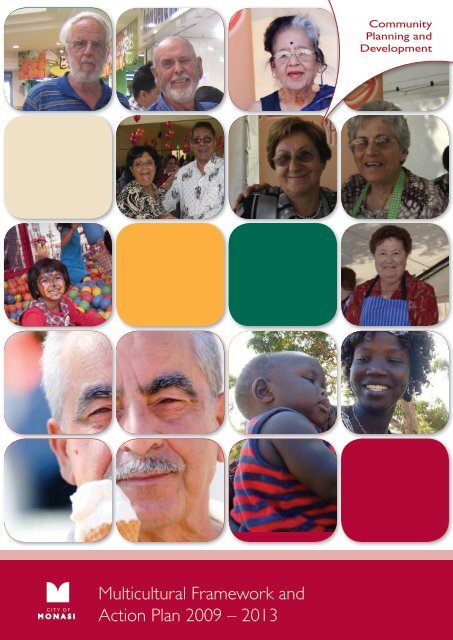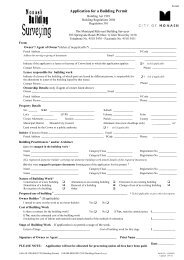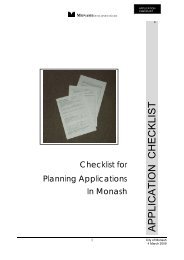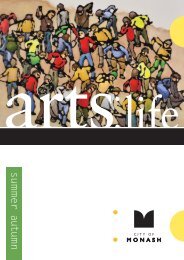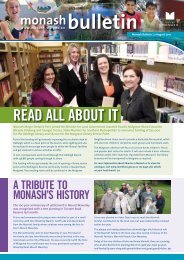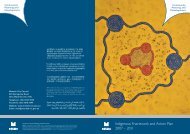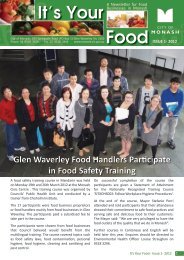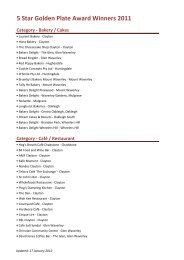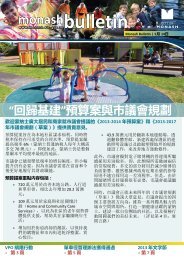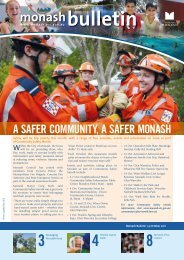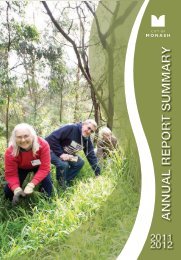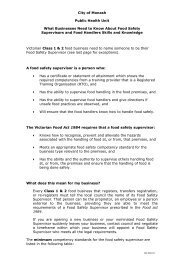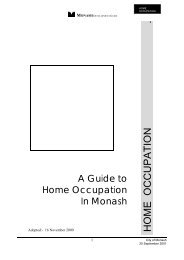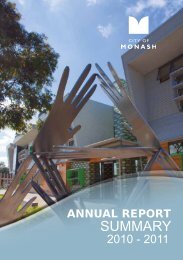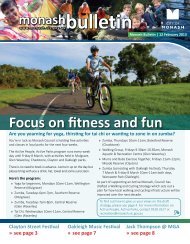Multicultural Framework and Action Plan 2009 â 2013 - City of Monash
Multicultural Framework and Action Plan 2009 â 2013 - City of Monash
Multicultural Framework and Action Plan 2009 â 2013 - City of Monash
Create successful ePaper yourself
Turn your PDF publications into a flip-book with our unique Google optimized e-Paper software.
Community<br />
<strong>Plan</strong>ning <strong>and</strong><br />
Development<br />
C I T Y O F<br />
M O N A S H<br />
<strong>Multicultural</strong> <strong>Framework</strong> <strong>and</strong><br />
<strong>Action</strong> <strong>Plan</strong> <strong>2009</strong> – <strong>2013</strong>
2<br />
Foreword by the Mayor<br />
I am pleased to present <strong>Monash</strong>’s <strong>Multicultural</strong><br />
<strong>Framework</strong> <strong>and</strong> <strong>Action</strong> <strong>Plan</strong> <strong>2009</strong> – <strong>2013</strong>.<br />
This <strong>Framework</strong> will guide Council over the next<br />
four years in meeting the needs <strong>and</strong> aspirations <strong>of</strong><br />
our culturally, linguistically <strong>and</strong> religiously diverse<br />
community.<br />
<strong>Monash</strong> is one<br />
<strong>of</strong> the most<br />
culturally diverse<br />
communities in<br />
Victoria <strong>and</strong> we are<br />
committed to<br />
ensuring that<br />
services, programs,<br />
resources <strong>and</strong><br />
other initiatives are<br />
relevant <strong>and</strong><br />
accessible to all<br />
members <strong>of</strong> the<br />
<strong>Monash</strong> community.<br />
Council is committed to maximising the benefits<br />
<strong>of</strong> our multicultural community by embracing,<br />
acknowledging <strong>and</strong> celebrating the contributions that<br />
people from migrant <strong>and</strong> refugee backgrounds have<br />
made to the economic, social, cultural <strong>and</strong> political life<br />
<strong>of</strong> the <strong>City</strong> <strong>of</strong> <strong>Monash</strong>.<br />
The <strong>Multicultural</strong> <strong>Framework</strong> <strong>and</strong> <strong>Action</strong> <strong>Plan</strong><br />
<strong>2009</strong> – <strong>2013</strong> demonstrates our commitment to<br />
continue to work towards building a strong, vibrant,<br />
safe, healthy <strong>and</strong>, inclusive community. A community<br />
free <strong>of</strong> disadvantage <strong>and</strong> discrimination, that values<br />
<strong>and</strong> respects difference, provides opportunities for<br />
participation in all facets <strong>of</strong> Council life, <strong>and</strong> celebrates<br />
achievements.<br />
The <strong>Framework</strong> has been developed in consultation<br />
with Council staff <strong>and</strong> with the <strong>Monash</strong> community<br />
<strong>and</strong> the actions outlined in the <strong>Action</strong> <strong>Plan</strong> will be<br />
implemented over the next four years.<br />
Cr Paul Klisaris<br />
Mayor<br />
T Y O F<br />
N A S H<br />
C I T Y O F<br />
M O N A S H<br />
N A S H<br />
C I T Y O F M O N A S H
3<br />
Contents<br />
Foreword by the Mayor................................................................................... 2<br />
Contents......................................................................................................... 3<br />
Summary in Languages other than English ................................................. 4<br />
1. <strong>Multicultural</strong> <strong>Framework</strong>............................................................................ 8<br />
1.1 Introduction............................................................................................ 8<br />
1.2 Council Vision ........................................................................................ 8<br />
1.3 Aim <strong>of</strong> the <strong>Multicultural</strong> <strong>Framework</strong> <strong>and</strong> <strong>Action</strong> <strong>Plan</strong>................................ 9<br />
1.4 Principles underpinning the <strong>Multicultural</strong> <strong>Framework</strong> <strong>and</strong> <strong>Action</strong> <strong>Plan</strong>...... 9<br />
1.5 Requirements for Success <strong>and</strong> Budget Implications................................ 9<br />
2. The Policy Context....................................................................................10<br />
2.1 <strong>Monash</strong> <strong>City</strong> Council Policy context.......................................................10<br />
2.2 Local Government.................................................................................10<br />
2.3 State Government..................................................................................12<br />
2.4 Commonwealth Government..................................................................14<br />
2.5 International..........................................................................................15<br />
3. Achievements............................................................................................16<br />
4. Development <strong>of</strong> the <strong>Multicultural</strong> <strong>Framework</strong> <strong>and</strong> <strong>Action</strong> <strong>Plan</strong>................17<br />
4.1 Research...............................................................................................17<br />
4.2 Consultation...........................................................................................17<br />
4.3 Analysis................................................................................................18<br />
<strong>Multicultural</strong> <strong>Framework</strong> <strong>and</strong> <strong>Action</strong> <strong>Plan</strong> <strong>2009</strong> – <strong>2013</strong>.................................20<br />
1. Community Capacity Building................................................................21<br />
2. Organisational Capacity Building...........................................................25<br />
3. Service Delivery....................................................................................29<br />
4. Leadership <strong>and</strong> Advocacy.....................................................................33<br />
5. Celebrating <strong>and</strong> Promoting <strong>Multicultural</strong>ism...........................................35<br />
6. Management <strong>and</strong> Implementation..........................................................36<br />
Appendix 1: Demographic data.....................................................................38<br />
Appendix 2: Definitions <strong>of</strong> Terms <strong>and</strong> Concepts......................................... 43<br />
Useful Resources..........................................................................................47<br />
<strong>Multicultural</strong> <strong>Framework</strong> <strong>and</strong> <strong>Action</strong> <strong>Plan</strong> <strong>2009</strong> – <strong>2013</strong>
4<br />
Summary in Languages other than English<br />
<strong>Multicultural</strong> <strong>Framework</strong> <strong>and</strong> <strong>Action</strong> <strong>Plan</strong> <strong>2009</strong> – <strong>2013</strong><br />
The <strong>Monash</strong> <strong>Multicultural</strong> <strong>Framework</strong> <strong>and</strong> <strong>Action</strong> <strong>Plan</strong> <strong>2009</strong> – <strong>2013</strong> is a strategic<br />
framework that outlines how Council will respond to cultural Diversity <strong>and</strong> in particular<br />
how it will address issues important to people from Culturally <strong>and</strong> Linguistically Diverse<br />
backgrounds in <strong>Monash</strong>.<br />
The <strong>Framework</strong> outlines specific strategies <strong>and</strong> actions to be implemented over the<br />
next four years by employing a whole <strong>of</strong> Council approach.<br />
For more information about the <strong>Monash</strong> <strong>Multicultural</strong> <strong>Framework</strong> <strong>and</strong> <strong>Action</strong> <strong>Plan</strong><br />
<strong>2009</strong><br />
Cantonese<br />
– <strong>2013</strong> in another format or in a language other than English, please contact the<br />
Community <strong>Plan</strong>ning <strong>and</strong> Development Unit on 9518 3625.<br />
Arabic<br />
<strong>Monash</strong> <strong>Multicultural</strong> <strong>Framework</strong> <strong>and</strong> <strong>Action</strong> <strong>Plan</strong> <strong>2009</strong>-<strong>2013</strong><br />
ARABIC: Arabic<br />
<strong>2009</strong> <strong>2013</strong><br />
The <strong>Monash</strong> <strong>Multicultural</strong> <strong>Framework</strong> <strong>and</strong> <strong>Action</strong> <strong>Plan</strong> <strong>2009</strong>-<strong>2013</strong> is a<br />
strategic framework that <strong>2013</strong> outlines <strong>2009</strong> how Council will respond to cultural<br />
Diversity <strong>and</strong> in particular how it will<br />
<strong>2009</strong> <br />
address issues important to people from<br />
Culturally <strong>and</strong> Linguistically Diverse backgrounds in <strong>Monash</strong>.<br />
خطة عمل موناش المتعددة الثقافات وإطار عملها<br />
خطة عمل موناش المتعددة الثقافات وإطار عملها<br />
تعتبر خطة عمل موناش المتعددة الثقافات وإطار عملها <strong>2013</strong> إطاراً استراتيجياً يعرض الطريقة<br />
التي ستستجيب البلدية فيها للتنوّع الثقافي وعلى وجه التحديد آيف ستعالج القضايا الهامة بالنسبة لأهالي موناش<br />
وإطار عملها <strong>2009</strong> <strong>2013</strong> إطاراً استراتيجياً يعرض الطريقة<br />
متنوّعة.<br />
الثقافات<br />
ولغوية<br />
المتعددة<br />
ثقافية<br />
موناش<br />
خلفيات<br />
عمل<br />
من<br />
خطة<br />
المتحدرين<br />
تعتبر<br />
التي ستستجيب البلدية فيها للتنوّع الثقافي وعلى وجه التحديد آيف ستعالج القضايا الهامة بالنسبة لأهالي موناش<br />
وتدابير محددّة تُطب َّق على مدى السنوات الأربعة القادمة من خلال<br />
متنوّعة.<br />
استراتيجيات<br />
ثقافية ولغوية<br />
أيضاً<br />
خلفيات<br />
العمل<br />
من<br />
إطار<br />
المتحدرين<br />
ويعرض<br />
اعتماد البلدية آكلّ متكامل.<br />
ويعرض إطار العمل أيضاً استراتيجيات وتدابير محددّة تُطب َّق على مدى السنوات الأربعة القادمة من خلال<br />
المعلومات عن خطة عمل موناش المتعددة الثقافات وإطار عملها<br />
متكامل.<br />
مزيد من<br />
آكلّ<br />
على<br />
البلدية<br />
للحصول<br />
اعتماد<br />
باللغة العربية أو بنموذج آخر يرجى الإتصال برقم المساعدة اللغوية 9321 أو بوحدة التخطيط والتنمية<br />
من المعلومات عن خطة عمل موناش المتعددة الثقافات وإطار عملها<br />
الرقم<br />
مزيد<br />
على<br />
على<br />
المجتمعية<br />
للحصول<br />
باللغة العربية أو بنموذج آخر يرجى الإتصال برقم المساعدة اللغوية 9321 أو بوحدة التخطيط والتنمية<br />
المجتمعية على الرقم<br />
The <strong>Framework</strong> outlines specific strategies <strong>and</strong> actions to be implemented<br />
over the next four years by employing a whole <strong>of</strong> Council approach.<br />
For more information about the <strong>Monash</strong> <strong>Multicultural</strong> <strong>Framework</strong> <strong>and</strong> <strong>Action</strong><br />
<strong>2009</strong>-<strong>2013</strong> <strong>Plan</strong> <strong>2013</strong><br />
in Cantonese or in another format please contact the<br />
Language Assist number 5480 9321 5481 or the Community <strong>Plan</strong>ning <strong>and</strong><br />
Development <strong>2013</strong> <strong>2009</strong> Unit on 9518 3625.<br />
.9518 3625<br />
5480<br />
.9518 3625<br />
CANTONESE:<br />
『<strong>2009</strong>-<strong>2013</strong> 年 <strong>Monash</strong> 多 元 文 化 框 架 和 行 動 計 劃 』<br />
『<strong>2009</strong>-<strong>2013</strong> 年 <strong>Monash</strong> 多 元 文 化 框 架 和 行 動 計 劃 』 是 一 個 戰 略 性 框 架 , 概 述<br />
了 市 議 會 將 如 何 應 對 文 化 多 樣 性 , 尤 其 是 如 何 解 決 對 <strong>Monash</strong> 市 內 具 有 多 樣 化<br />
文 化 和 語 言 背 景 的 人 們 十 分 重 要 的 問 題 。<br />
該 框 架 概 述 了 今 後 四 年 內 將 通 過 市 議 會 的 綜 合 性 方 式 實 施 的 具 體 戰 略 和 行 動 。<br />
如 需 關 於 『<strong>2009</strong>-<strong>2013</strong> 年 <strong>Monash</strong> 多 元 文 化 框 架 和 行 動 計 劃 』 的 中 文 版 或 其 他<br />
格 式 的 資 訊 , 請 致 電 語 言 協 助 (Language Assist,9321 5481) 或 社 區 規 劃 和<br />
發 展 部 (Community <strong>Plan</strong>ning <strong>and</strong> Development Unit,9518 3625)。<br />
T Y O F<br />
N A S H<br />
C I T Y O F<br />
M O N A S H<br />
N A S H<br />
C I T Y O F M O N A S H
5<br />
GREEK:<br />
Greek<br />
Πολυπολιτισµικό Πλαίσιο και Σχέδιο ∆ράσης <strong>2009</strong>-<strong>2013</strong> του ∆ήµου<br />
<strong>Monash</strong><br />
Το Πολυπολιτισµικό Πλαίσιο και Σχέδιο ∆ράσης <strong>2009</strong>-<strong>2013</strong> του ∆ήµου<br />
<strong>Monash</strong> (<strong>Monash</strong> <strong>Multicultural</strong> <strong>Framework</strong> <strong>and</strong> <strong>Action</strong> <strong>Plan</strong>) είναι το<br />
στρατηγικό πλαίσιο που περιγράφει τους τρόπους µε τους οποίους ο ∆ήµος<br />
θα ανταποκριθεί στην πολιτισµική πολυµορφία και ειδικότερα πώς θα<br />
αντιµετωπίσει τα θέµατα που είναι σηµαντικά σε άτοµα µεταναστευτικών<br />
κοινοτήτων στο <strong>Monash</strong>.<br />
Το Πλαίσιο περιγράφει συγκεκριµένες στρατηγικές και ενέργειες που θα<br />
εφαρµοστούν στα επόµενα τέσσερα χρόνια υλοποιώντας µια προσέγγιση<br />
στην οποία θα συµµετέχουν όλες οι υπηρεσίες του ∆ήµου.<br />
Για περισσότερες πληροφορίες σχετικά µε το Πολυπολιτισµικό Πλαίσιο και<br />
Σχέδιο ∆ράσης <strong>2009</strong>-<strong>2013</strong> στα ελληνικά ή σε άλλη έντυπη µορφή<br />
επικοινωνήστε µε την υπηρεσία Γλωσσικής Βοήθειας στον αριθµό 9321 5482<br />
ή µε τη Μονάδα Κοινοτικού Προγραµµατισµού και Ανάπτυξης στο 9518 3625.<br />
ITALIAN: Italian<br />
Struttura e Piano d'Azione <strong>Multicultural</strong>e del Comune di <strong>Monash</strong><br />
La Struttura e il Piano d'Azione <strong>Multicultural</strong>e del Comune di <strong>Monash</strong> (ossia<br />
<strong>Monash</strong> <strong>Multicultural</strong> <strong>Framework</strong> <strong>and</strong> <strong>Action</strong> <strong>Plan</strong>) <strong>2009</strong>-<strong>2013</strong> è un documento<br />
che descrive il modo in cui l'amministrazione comunale risponderà alle<br />
differenze culturali e in particolare come reagirà alla problematica d'interesse<br />
alle persone di origine non angl<strong>of</strong>ona residenti nel territorio comunale.<br />
La Struttura descrive strategie ed iniziative particolari da implementarsi nel<br />
corso dei prossimi quattro anni integr<strong>and</strong>o tutte le attività dell'amministrazione<br />
comunale.<br />
Per ulteriori informazioni sulla Struttura e il Piano d'Azione <strong>Multicultural</strong>e del<br />
Comune di <strong>Monash</strong> (ossia <strong>Monash</strong> <strong>Multicultural</strong> <strong>Framework</strong> <strong>and</strong> <strong>Action</strong> <strong>Plan</strong>)<br />
<strong>2009</strong>-<strong>2013</strong> in italiano o sotto qualche altra forma vi preghiamo di contattare il<br />
servizio di assistenza linguistica Language Assist telefon<strong>and</strong>o al 9321 5483 o<br />
chiam<strong>and</strong>o l'ufficio Community <strong>Plan</strong>ning <strong>and</strong> Development Unit al numero<br />
9518 3625.<br />
<strong>Multicultural</strong> <strong>Framework</strong> <strong>and</strong> <strong>Action</strong> <strong>Plan</strong> <strong>2009</strong> – <strong>2013</strong>
6<br />
Korean<br />
KOREAN:<br />
모나시 다문화 프레임워크 및 액션 플랜 <strong>2009</strong>-<strong>2013</strong><br />
모나시 다문화 프레임워크 및 액션 플랜 <strong>2009</strong>-<strong>2013</strong> 은 카운슬이 문화적<br />
다양성에 대해 어떻게 대응할 지 그리고 특히 모나시에서 문화적 언어적으로<br />
다양한 배경 출신의 사람들에게 중요한 사안을 어떻게 다룰 지에 대해<br />
기술하는 전략적 프레임워크입니다.<br />
이 프레임워크는 카운슬 전체가 관여하면서 차후 4 년에 걸쳐 시행될 특정한<br />
전략 및 액션을 기술합니다.<br />
한국어로 된 혹은 다른 포맷으로 된 모나시 다문화 프레임워크 및 액션 플랜<br />
<strong>2009</strong>-<strong>2013</strong> 에 관해 더 자세한 정보를 원하시면 언어 지원 번호 9321 5484 혹은<br />
지역사회 기획 및 발전 부서인 9518 3625 로 연락하십시오.<br />
MANDARIN:<br />
M<strong>and</strong>arin<br />
<strong>2009</strong>-<strong>2013</strong> 年 蒙 纳 士 多 元 文 化 架 构 与 行 动 计 划<br />
《<strong>2009</strong>-<strong>2013</strong> 年 蒙 纳 士 多 元 文 化 架 构 与 行 动 计 划 》 是 一 项 战 略 架 构 , 它 概 述 了 市<br />
政 府 将 如 何 应 对 文 化 多 样 性 , 特 别 是 如 何 解 决 对 蒙 纳 士 各 种 文 化 和 语 言 背 景 人<br />
士 的 重 要 问 题 。<br />
《 架 构 》 概 述 了 今 后 四 年 中 通 过 采 用 市 政 府 全 套 措 施 来 执 行 的 特 定 策 略 和 行<br />
动 。<br />
若 想 以 普 通 话 或 其 他 形 式 了 解 《<strong>2009</strong>-<strong>2013</strong> 年 蒙 纳 士 多 元 文 化 架 构 与 行 动 计 划 》<br />
的 详 情 , 请 致 电 语 言 协 助 电 话 9321 5485 或 社 区 规 划 和 发 展 组 电 话 9518<br />
3625。<br />
T Y O F<br />
N A S H<br />
C I T Y O F<br />
M O N A S H<br />
N A S H<br />
C I T Y O F M O N A S H
7<br />
RUSSIAN:<br />
Русский<br />
Общая концепция и план действий в сфере мультикультурализма<br />
Муниципального Совета <strong>Monash</strong> на <strong>2009</strong>-1013 годы<br />
Общая концепция и план действий в сфере мультикультурализма<br />
Муниципального Совета <strong>Monash</strong> на <strong>2009</strong>-<strong>2013</strong> годы является стратегической<br />
основой, в рамках которой Муниципальный Совет будет осуществлять свою<br />
деятельность в вопросах этнического многообразия, в частности при решении<br />
проблем, имеющих большое значение для людей различного этнического<br />
происхождения в районе <strong>Monash</strong>.<br />
Общая концепция предусматривает конкретные стратегии и меры, которые<br />
намечается осуществить в течение следующих четырех лет путем вовлечения в<br />
этот процесс всех отделов и служб Муниципального Совета.<br />
Более подробную информацию об Общей концепции и плане действий в сфере<br />
мультикультурализма Муниципального Совета <strong>Monash</strong> на <strong>2009</strong>-<strong>2013</strong> годы на<br />
русском языке или в другом формате можно получить, позвонив в языковую<br />
службу Language Assist по номеру 9321 5486 или в Отдел общественного<br />
планирования и развития по номеру 9518 3625.<br />
VIETNAMESE:<br />
Vietnamese<br />
Khuôn Khổ Làm Việc Và Kế Hoạch Hành Động Đa Văn Hóa <strong>Monash</strong> Năm<br />
<strong>2009</strong>-<strong>2013</strong><br />
Khuôn Khổ Làm Việc Và Kế Hoạch Hành Động Đa Văn Hóa <strong>Monash</strong> Năm<br />
<strong>2009</strong>-<strong>2013</strong> là khuôn khổ làm việc chiến lược trình bày cách thức Hội Đồng<br />
Thành Phố đáp ứng Đặc Tính Đa Văn Hóa và đặc biệt là cách thức Hội Đồng<br />
Thành Phố sẽ giải quyết những vấn đề quan trọng đối với người có nguồn<br />
gốc Văn Hóa và Ngôn Ngữ Đa Dạng trong địa phận <strong>Monash</strong>.<br />
Khuôn khổ làm việc này trình bày những sách lược và hành động cụ thể sẽ<br />
được thực hiện trong bốn năm tới theo phương pháp toàn Hội Đồng Thành<br />
Phố.<br />
Muốn biết thêm thông tin về Khuôn Khổ Làm Việc Và Kế Hoạch Hành Động<br />
Đa Văn Hóa <strong>Monash</strong> Năm <strong>2009</strong>-<strong>2013</strong> bằng tiếng Việt hay bằng dạng thức<br />
khác, xin liên lạc với Dịch Vụ Trợ Giúp Ngôn Ngữ qua số 9321 5487 hoặc<br />
Ban Phát Triển và Quy Hoạch Cộng Đồng theo số 9518 3625.<br />
<strong>Multicultural</strong> <strong>Framework</strong> <strong>and</strong> <strong>Action</strong> <strong>Plan</strong> <strong>2009</strong> – <strong>2013</strong>
8<br />
1. <strong>Multicultural</strong> <strong>Framework</strong><br />
1.1 Introduction<br />
The <strong>Monash</strong> <strong>Multicultural</strong> <strong>Framework</strong> <strong>and</strong> <strong>Action</strong> <strong>Plan</strong> <strong>2009</strong> – <strong>2013</strong> will guide Council in<br />
achieving meaningful outcomes for <strong>Monash</strong>’s cultural, linguistic <strong>and</strong> religious diversity<br />
over the next four years.<br />
The <strong>Monash</strong> <strong>Multicultural</strong> <strong>Framework</strong> <strong>and</strong> <strong>Action</strong> <strong>Plan</strong> <strong>2009</strong> – <strong>2013</strong> outlines Council’s<br />
key priority strategies on how it will respond to the cultural, linguistic <strong>and</strong> religious<br />
diversity <strong>of</strong> the <strong>Monash</strong> community.<br />
The <strong>Framework</strong> has been developed in consultation with Council staff <strong>and</strong> the <strong>Monash</strong><br />
community <strong>and</strong> will build on current achievements <strong>and</strong> further strengthen Council’s<br />
ability to continue to address access <strong>and</strong> inclusion issues as these relate to people<br />
from culturally <strong>and</strong> linguistically diverse backgrounds.<br />
The <strong>Framework</strong> is underpinned by Council’s commitment to engage the whole <strong>of</strong> Council,<br />
<strong>and</strong> where appropriate community organisations <strong>and</strong> agencies, in the implementation<br />
<strong>of</strong> the actions outlined in the <strong>Action</strong> <strong>Plan</strong>. However the overall management,<br />
implementation <strong>and</strong> evaluation <strong>of</strong> the <strong>Framework</strong> <strong>and</strong> <strong>Action</strong> <strong>Plan</strong> <strong>and</strong> reporting to<br />
Council <strong>and</strong> other entities lies with the Community <strong>Plan</strong>ning <strong>and</strong> Development Unit.<br />
1.2 Council Vision<br />
The <strong>Multicultural</strong> <strong>Framework</strong> <strong>and</strong> <strong>Action</strong> <strong>Plan</strong> <strong>2009</strong>–<strong>2013</strong> supports Strategic<br />
Objective One ‘Our Community’, as outlined in the <strong>Monash</strong> Council <strong>Plan</strong><br />
<strong>2009</strong> – <strong>2013</strong>. It specifically states:<br />
“ A <strong>Monash</strong> community, where people <strong>of</strong> all ages,<br />
backgrounds <strong>and</strong> abilities, are embraced <strong>and</strong> supported<br />
<strong>and</strong> can access Council services they need.<br />
A <strong>Monash</strong> community that is connected <strong>and</strong> involved<br />
in shaping decisions that affect them.”<br />
T Y O F<br />
N A S H<br />
C I T Y O F<br />
M O N A S H<br />
N A S H<br />
C I T Y O F M O N A S H
9<br />
1.3 Aim <strong>of</strong> the <strong>Multicultural</strong> <strong>Framework</strong> <strong>and</strong><br />
<strong>Action</strong> <strong>Plan</strong> <strong>2009</strong> – <strong>2013</strong><br />
The aim <strong>of</strong> the <strong>Multicultural</strong> <strong>Framework</strong> <strong>and</strong> <strong>Action</strong> <strong>Plan</strong> <strong>2009</strong> – <strong>2013</strong> is a whole <strong>of</strong><br />
council approach to multicultural affairs in the <strong>City</strong> <strong>of</strong> <strong>Monash</strong>.<br />
The <strong>Framework</strong> will specifically guide Council to respond effectively <strong>and</strong> in an<br />
appropriate <strong>and</strong> timely manner to the needs <strong>and</strong> aspirations <strong>of</strong> people from the culturally<br />
<strong>and</strong> linguistically diverse community in the <strong>City</strong> <strong>of</strong> <strong>Monash</strong>, both at an organisational<br />
<strong>and</strong> community level.<br />
1.4 Principles underpinning the <strong>Multicultural</strong> <strong>Framework</strong><br />
<strong>and</strong> <strong>Action</strong> <strong>Plan</strong><br />
The <strong>Multicultural</strong> <strong>Framework</strong> <strong>and</strong> <strong>Action</strong> <strong>Plan</strong> is guided by the following principles:<br />
• Council values, encourages <strong>and</strong> celebrates cultural diversity<br />
• Council provides services <strong>and</strong> programs in an accessible <strong>and</strong> equitable way<br />
• Council encourages <strong>and</strong> facilitates participation in all aspects <strong>of</strong> Council life<br />
• Council promotes harmony <strong>and</strong> social cohesion<br />
• Council is committed to the development <strong>of</strong> organisational Cultural competence<br />
• Council is committed to a whole <strong>of</strong> council approach to multiculturalism<br />
1.5 Requirements for Success <strong>and</strong> Budget Implications<br />
The implementation <strong>of</strong> the actions in the <strong>Multicultural</strong> <strong>Framework</strong> <strong>and</strong> <strong>Action</strong> <strong>Plan</strong><br />
<strong>2009</strong> – <strong>2013</strong> will have budget <strong>and</strong> resource implications for Council. Council will ensure<br />
that each budget cycle will give consideration to the allocation <strong>of</strong> resources to support<br />
the implementation <strong>of</strong> the actions.<br />
In addition Council will achieve successful implementation <strong>of</strong> the <strong>Multicultural</strong><br />
<strong>Framework</strong> <strong>and</strong> <strong>Action</strong> <strong>Plan</strong> by working in conjunction with Council staff, key<br />
community organisations <strong>and</strong> agencies <strong>and</strong> through:<br />
• the development <strong>of</strong> an operational plan in consultation with the <strong>Multicultural</strong> Advisory<br />
Committee, which will detail specific actions <strong>and</strong> outcomes;<br />
• coordination <strong>of</strong> a whole <strong>of</strong> Council approach;<br />
• the support <strong>of</strong> the CEO <strong>and</strong> the corporate management team;<br />
• support <strong>and</strong> empowerment <strong>of</strong> staff;<br />
• monitoring, evaluation <strong>and</strong> reporting to Council <strong>and</strong> the community;<br />
• building <strong>of</strong> participatory relationships with internal <strong>and</strong> external stakeholders; <strong>and</strong><br />
• inclusive consultation <strong>and</strong> engagement processes <strong>and</strong> structures<br />
<strong>Multicultural</strong> <strong>Framework</strong> <strong>and</strong> <strong>Action</strong> <strong>Plan</strong> <strong>2009</strong> – <strong>2013</strong>
10<br />
2. The Policy Context<br />
The development <strong>of</strong> the <strong>Monash</strong> <strong>Multicultural</strong> <strong>Framework</strong> <strong>and</strong> <strong>Action</strong> <strong>Plan</strong><br />
<strong>2009</strong> – <strong>2013</strong> was undertaken within the context <strong>of</strong> broader international, national,<br />
state <strong>and</strong> local government policies, strategies <strong>and</strong> legislation.<br />
2.1 <strong>Monash</strong> <strong>City</strong> Council Policy context<br />
The <strong>Monash</strong> <strong>Multicultural</strong> <strong>Framework</strong> <strong>and</strong> <strong>Action</strong> <strong>Plan</strong> <strong>2009</strong>–2012 links with <strong>and</strong><br />
supports a number <strong>of</strong> Council plans <strong>and</strong> strategies, which collectively address the<br />
objectives <strong>of</strong> the Council <strong>Plan</strong> <strong>2009</strong> – <strong>2013</strong>. These include:<br />
• Council <strong>Plan</strong> <strong>2009</strong> – <strong>2013</strong><br />
• Municipal Public Health <strong>Plan</strong><br />
• The Arts <strong>and</strong> Culture Strategy<br />
• The Disability Access <strong>and</strong> Inclusion <strong>Framework</strong><br />
2.2 Local Government<br />
Local Government Act<br />
Local Government in Victoria is administered under the Local Government Act 1989<br />
which provides a framework for Councils by articulating their purpose, objectives,<br />
functions <strong>and</strong> powers. Local Government is responsible for delivering a wide range <strong>of</strong><br />
economic, environmental <strong>and</strong> human services <strong>and</strong> for providing physical infrastructure.<br />
It also provides leadership <strong>and</strong> governance to local communities.<br />
There are a number <strong>of</strong> specific sections in the Act, which have guided the<br />
development <strong>of</strong> the <strong>Multicultural</strong> <strong>Framework</strong>. Specifically section 3C (2) states<br />
that in seeking to achieve its primary objective, a Council must have regard to the<br />
following facilitating objectives-<br />
(c)<br />
(e)<br />
to improve the overall quality <strong>of</strong> life <strong>of</strong> people in the local community;<br />
to ensure that services <strong>and</strong> facilities provided by the Council are accessible<br />
<strong>and</strong> equitable; <strong>and</strong><br />
with respect to the role <strong>of</strong> a Council, Section 3D (2) states that the role <strong>of</strong> a Council<br />
includes-<br />
(a)<br />
(f)<br />
acting as a representative government by taking into account the diverse needs<br />
<strong>of</strong> the local community in decision making; <strong>and</strong><br />
fostering community cohesion <strong>and</strong> encouraging active participation in civic life<br />
T Y O F<br />
N A S H<br />
C I T Y O F<br />
M O N A S H<br />
N A S H<br />
C I T Y O F M O N A S H
11<br />
Australian Local Government Association (ALGA)<br />
ALGA has a ‘Statement <strong>of</strong> Cultural Inclusiveness’ policy, which was endorsed at the<br />
National General Assembly <strong>of</strong> Local Government 2001. The Statement affirms a local<br />
government commitment to the right <strong>of</strong> all Australians to enjoy equal rights <strong>and</strong> be<br />
treated with equal respect, regardless <strong>of</strong> race, colour, creed or origin.<br />
Municipal Association <strong>of</strong> Victoria (MAV)<br />
The MAV Board endorsed the MAV ‘Statement <strong>of</strong> commitment to Cultural Diversity’ in<br />
2007. The Statement affirms that:<br />
The MAV, as part <strong>of</strong> its commitment to nurturing, promoting <strong>and</strong> celebrating cultural<br />
diversity <strong>and</strong> an inclusive local government sector commits itself to:<br />
• Support local government to strengthen <strong>and</strong> further develop its organisational<br />
capacity to address, embrace <strong>and</strong> engage with cultural diversity<br />
• Facilitate the development <strong>of</strong> knowledge to support council staff <strong>and</strong> councillors to<br />
develop appropriate policies <strong>and</strong> strategies <strong>and</strong> to provide appropriate services <strong>and</strong><br />
programs for culturally diverse communities<br />
• Encourage <strong>and</strong> facilitate the acquisition <strong>of</strong> cultural awareness by all local government<br />
staff <strong>and</strong> councillors<br />
• Encourage <strong>and</strong> facilitate partnership <strong>and</strong> relationship development between the<br />
local government sector <strong>and</strong> the ethnic sector<br />
• Advocate on behalf <strong>of</strong> local government on cultural diversity <strong>and</strong> Interfaith issues<br />
• Support local councils in promoting <strong>and</strong> celebrating the economic, cultural <strong>and</strong><br />
social benefits <strong>of</strong> cultural diversity<br />
• Support local councils in promoting cohesive <strong>and</strong> harmonious communities <strong>and</strong><br />
good community relations<br />
• Support local councils in promoting access, equity, social justice, participation <strong>and</strong><br />
community capacity building for local government’s culturally diverse communities<br />
Victorian Local Government Association (VLGA)<br />
The VLGA has social policy objectives that reflect a commitment to best practice <strong>and</strong><br />
continuous improvement in supporting <strong>and</strong> responding to cultural diversity.<br />
<strong>Multicultural</strong> <strong>Framework</strong> <strong>and</strong> <strong>Action</strong> <strong>Plan</strong> <strong>2009</strong> – <strong>2013</strong>
12<br />
2.3 State Government<br />
All <strong>of</strong> Us – Victoria’s <strong>Multicultural</strong> Policy<br />
The Government’s approach to multicultural affairs is expressed in its <strong>Multicultural</strong><br />
Policy ‘All <strong>of</strong> Us’ launched in <strong>2009</strong>. The policy builds on the principles <strong>of</strong> the <strong>Multicultural</strong><br />
Victoria Act 2004 <strong>and</strong> addresses the following themes: <strong>Multicultural</strong>ism advances<br />
equality <strong>and</strong> human rights; <strong>Multicultural</strong>ism supports our cultural, linguistic <strong>and</strong> religious<br />
diversity; <strong>Multicultural</strong>ism fosters unity <strong>and</strong> promotes harmony; <strong>Multicultural</strong>ism boosts<br />
our economic advantage.<br />
<strong>Multicultural</strong> Victorian Act 2004<br />
The principles <strong>of</strong> multiculturalism outlined in the Act are:<br />
• All individuals in Victoria are entitled to mutual respect <strong>and</strong> underst<strong>and</strong>ing regardless<br />
<strong>of</strong> their cultural, religious, racial <strong>and</strong> linguistic backgrounds.<br />
• All individuals <strong>and</strong> institutions in Victoria should promote <strong>and</strong> preserve diversity<br />
<strong>and</strong> cultural heritage within the context <strong>of</strong> shared laws, values, aspirations <strong>and</strong><br />
responsibilities.<br />
• All individuals in Victoria (regardless <strong>of</strong> background) have shown that they can work<br />
together to build a positive <strong>and</strong> progressive future <strong>and</strong> this co-operation is to be<br />
encouraged so as to enhance Victoria as a great place in which to live, work, invest<br />
<strong>and</strong> raise a family.<br />
• All individuals in Victoria are equally entitled to access opportunities <strong>and</strong> participate<br />
in <strong>and</strong> contribute to the social, cultural, economic <strong>and</strong> political life <strong>of</strong> this State.<br />
• All Victorians have a responsibility to abide by the State’s laws <strong>and</strong> respect the<br />
democratic processes under which those laws are made.<br />
The Charter <strong>of</strong> Human Rights <strong>and</strong> Responsibilities Act 2006<br />
The Victorian Charter <strong>of</strong> Human Rights <strong>and</strong> Responsibilities is to protect <strong>and</strong><br />
promote human rights through:<br />
• Setting out the human rights that Parliament specifically seeks to protect <strong>and</strong> promote<br />
• Ensuring that all statutory provisions, whenever enacted, are interpreted so far as is<br />
possible in a way that is compatible with human rights<br />
• Imposing an obligation on all public authorities to act in a way that is compatible with<br />
human rights<br />
• Requiring statements <strong>of</strong> compatibility with human rights to be prepared in respect <strong>of</strong><br />
T Y O F<br />
N A S H<br />
C I T Y O F<br />
M O N A S H<br />
N A S H<br />
C I T Y O F M O N A S H
13<br />
all Bills introduced into Parliament <strong>and</strong> enabling the Scrutiny <strong>of</strong> Acts <strong>and</strong> Regulations<br />
Committee to report on such compatibility<br />
• Conferring jurisdiction on the Supreme Court to declare that a statutory provision<br />
cannot be interpreted consistently with a human right <strong>and</strong> requiring the relevant<br />
Minister to respond to that declaration<br />
Racial <strong>and</strong> Religious Tolerance Act 2001<br />
The Racial <strong>and</strong> Religious Tolerance Act 2002 promotes racial <strong>and</strong> religious freedom; it<br />
promotes the right <strong>of</strong> all people to be treated with dignity <strong>and</strong> respect.<br />
The Equal Opportunity Act 1995<br />
The objectives <strong>of</strong> the Act include:<br />
• Promoting everyone’s right to equal opportunity<br />
• Eliminating, as far as possible discrimination <strong>and</strong> sexual harassment; <strong>and</strong><br />
• Providing redress for people whose rights have been breached<br />
A Fairer Victoria: Strong People, Strong Communities <strong>2009</strong><br />
A Fairer Victoria is a long term commitment to reducing inequality <strong>and</strong> disadvantage<br />
<strong>and</strong> focuses on four priorities areas for economic <strong>and</strong> social participation which<br />
include: giving all Victorian children the best start in life; improving education <strong>and</strong><br />
helping people into work; improving health <strong>and</strong> wellbeing <strong>and</strong> developing liveable<br />
communities.<br />
Local Government Response to Cultural Diversity in Victoria<br />
In 2003 the Victorian <strong>Multicultural</strong> Commission funded the project ‘Analysis <strong>of</strong> Local<br />
Government’s Response to Cultural Diversity’. This report provides a framework to<br />
assist local government to respond appropriately <strong>and</strong> effectively to the needs <strong>of</strong><br />
culturally <strong>and</strong> linguistically diverse communities.<br />
<strong>Multicultural</strong> <strong>Framework</strong> <strong>and</strong> <strong>Action</strong> <strong>Plan</strong> <strong>2009</strong> – <strong>2013</strong>
14<br />
2.4 Commonwealth Government<br />
<strong>Multicultural</strong> Australia: Unity in Diversity.<br />
Unity in Diversity is the Commonwealth Government’s policy statement on<br />
multiculturalism. This policy was adopted in May 2003 <strong>and</strong> is underpinned by the<br />
following principles:<br />
Responsibilities for all: all Australians have a civic duty to support those basic<br />
structures <strong>and</strong> principles <strong>of</strong> Australian society which guarantee us our freedom <strong>and</strong><br />
equality <strong>and</strong> enable diversity in our society to flourish;<br />
Respect for each person: subject to the law, all Australians have the right to express<br />
their own culture <strong>and</strong> beliefs <strong>and</strong> have a reciprocal obligation to respect the right <strong>of</strong><br />
others to do the same;<br />
Fairness for each person: all Australians are entitled to equality <strong>of</strong> treatment <strong>and</strong><br />
opportunity. Social equity allows us all to contribute to the social, political <strong>and</strong> economic<br />
life <strong>of</strong> Australia, free from discrimination, including on the grounds <strong>of</strong> race, culture,<br />
religion, language, location, gender or place <strong>of</strong> birth; <strong>and</strong><br />
Benefits for all: all Australians benefit from productive diversity, that is the significant<br />
cultural, social <strong>and</strong> economic dividends arising from the diversity <strong>of</strong> our population.<br />
Diversity works for all Australians.<br />
The Charter <strong>of</strong> Public Service in a Culturally Diverse Society<br />
The Charter was launched by the Commonwealth Government in 1998 <strong>and</strong> has been<br />
endorsed by Commonwealth, State <strong>and</strong> Territory Governments <strong>and</strong> by the Australian<br />
Local Government Association.<br />
The Charter has seven principles: Access, Equity, Communication, Responsiveness,<br />
Effectiveness, Efficiency, <strong>and</strong> Accountability.<br />
T Y O F<br />
N A S H<br />
C I T Y O F<br />
M O N A S H<br />
N A S H<br />
C I T Y O F M O N A S H
15<br />
2.5 International<br />
Universal Declaration on Cultural Diversity<br />
Article 1 <strong>of</strong> the UNESCO Universal Declaration on Cultural Diversity, adopted in<br />
November 2001, states that “cultural diversity is the common heritage <strong>of</strong> humanity <strong>and</strong><br />
should be recognised <strong>and</strong> affirmed for the benefit <strong>of</strong> present <strong>and</strong> future generations”.<br />
Article 4 <strong>of</strong> the Universal Declaration <strong>of</strong> Human Rights states that<br />
“ the defence <strong>of</strong> cultural diversity …<br />
implies a commitment to human rights <strong>and</strong><br />
fundamental freedoms, in particular the rights <strong>of</strong><br />
persons belonging to minorities <strong>and</strong> those <strong>of</strong><br />
indigenous peoples” .<br />
Article 5 entitled cultural rights as an enabling environment<br />
for cultural diversity states:<br />
“Cultural rights are an integral part <strong>of</strong> human rights,<br />
which are universal, indivisible <strong>and</strong> interdependent.<br />
The flourishing <strong>of</strong> creative diversity requires the<br />
full implementation <strong>of</strong> cultural rights as defined in<br />
Article 27 <strong>of</strong> the Universal Declaration <strong>of</strong> Human Rights<br />
<strong>and</strong> in Articles 13 <strong>and</strong> 15 <strong>of</strong> the International Covenant<br />
on Economic, Social <strong>and</strong> Cultural Rights. All persons have<br />
therefore the right to express themselves <strong>and</strong> to create <strong>and</strong><br />
disseminate their work in the language <strong>of</strong> their choice<br />
<strong>and</strong> particularly in their mother tongue; all persons are<br />
entitled to quality education <strong>and</strong> training that fully respect<br />
their cultural identity; <strong>and</strong> all persons have the right to<br />
participate in the cultural life <strong>of</strong> their choice <strong>and</strong> conduct<br />
their own cultural practices, subject to respect for<br />
human rights <strong>and</strong> fundamental freedoms”.<br />
<strong>Multicultural</strong> <strong>Framework</strong> <strong>and</strong> <strong>Action</strong> <strong>Plan</strong> <strong>2009</strong> – <strong>2013</strong>
16<br />
3. Achievements<br />
<strong>Monash</strong> <strong>City</strong> Council is committed to the provision <strong>of</strong> quality services <strong>and</strong> programs<br />
that respond to the needs <strong>of</strong> all members <strong>of</strong> the <strong>Monash</strong> community including members<br />
from culturally <strong>and</strong> linguistically diverse backgrounds.<br />
Council is proud to report some <strong>of</strong> the key achievements in multicultural affairs.<br />
These include:<br />
• Signing <strong>of</strong> the Community Accord in 2005<br />
• Establishing <strong>Monash</strong> as a Refugee Welcome Zone in 2002<br />
• Introduction <strong>of</strong> the <strong>Monash</strong> Language Assist in 2008<br />
• Provision <strong>of</strong> interpreting & translating services<br />
• Establishment <strong>of</strong> a monitoring mechanism <strong>of</strong> Interpreter usage by the Maternal<br />
<strong>and</strong> Child Health Services<br />
• Translation <strong>of</strong> the <strong>Monash</strong> Bulletin in Chinese, Greek <strong>and</strong> Italian languages<br />
• Provision <strong>of</strong> website information in LOTE<br />
• Establishing the <strong>Monash</strong> Interfaith Gathering<br />
• Establishing the <strong>Multicultural</strong> Advisory Committee<br />
• Establishing the Senior Citizens Forum (Ethnic)<br />
• Funding <strong>of</strong> Southern Ethnic Advisory <strong>and</strong> Advocacy Council to employ a youth<br />
worker to deliver services to CALD youth & their families<br />
• Allocation <strong>of</strong> cash <strong>and</strong> in-kind funding through the Community Grants program to<br />
support senior citizens groups<br />
• Funding <strong>of</strong> the New Hope MRC to deliver mentoring, support <strong>and</strong> advocacy for<br />
elderly CALD groups <strong>and</strong> individuals<br />
• Introduction <strong>of</strong> the Ethnic meals program<br />
• Supporting community festivals & celebrating cultural diversity<br />
• Establishment <strong>of</strong> the Flavours <strong>of</strong> <strong>Monash</strong> project<br />
• Establishment <strong>of</strong> the Chinese Mothers’ Group by Maternal Child Health<br />
• Development by MYFS & Hope Theatre Group film production <strong>of</strong> – ‘The Family’ –<br />
a film, focusing on issues impacting on South Sudanese community<br />
• All Community Grants Applications <strong>and</strong> Policies <strong>and</strong> Procedures are available in the<br />
Greek, Italian <strong>and</strong> Chinese languages <strong>and</strong> all applications are accepted in LOTE<br />
• Establishment <strong>of</strong> the Access <strong>and</strong> Equity Cross Organisational Group to oversee the<br />
review & implementation <strong>of</strong> Council’s <strong>Multicultural</strong> <strong>and</strong> Disability <strong>Framework</strong>s <strong>and</strong><br />
<strong>Action</strong> <strong>Plan</strong>s<br />
T Y O F<br />
N A S H<br />
C I T Y O F<br />
M O N A S H<br />
N A S H<br />
C I T Y O F M O N A S H
17<br />
4. Development <strong>of</strong> the <strong>Multicultural</strong> <strong>Framework</strong><br />
<strong>and</strong> <strong>Action</strong> <strong>Plan</strong><br />
The <strong>Multicultural</strong> <strong>Framework</strong> <strong>and</strong> <strong>Action</strong> <strong>Plan</strong> <strong>2009</strong> – <strong>2013</strong> was developed through<br />
the following key phases:<br />
4.1 Research<br />
Council undertook a Research <strong>and</strong> Review Project ‘Communicating <strong>and</strong> Engaging with<br />
Culturally <strong>and</strong> Linguistically Diverse Communities’ to review Council’s effectiveness in<br />
communicating <strong>and</strong> engaging with culturally <strong>and</strong> linguistically diverse communities.<br />
The aim <strong>of</strong> the project was to undertake a research <strong>and</strong> consultation process with<br />
CALD communities <strong>and</strong> Council staff to assist Council to identify communication,<br />
engagement <strong>and</strong> training issues <strong>and</strong> to develop appropriate strategies to strengthen<br />
the effectiveness <strong>of</strong> Council’s current communication, engagement <strong>and</strong> training<br />
methods with the <strong>City</strong>’s CALD communities.<br />
The research included a number <strong>of</strong> key steps including:<br />
• A literature review<br />
• A benchmark analysis with four other local government areas<br />
• An internal Council review to identify current practice in communicating with <strong>and</strong><br />
engaging CALD communities<br />
• A review <strong>of</strong> communication <strong>and</strong> engagement methods used to assess user satisfaction<br />
<strong>and</strong> degree <strong>of</strong> CALD community inclusiveness<br />
4.2 Consultation<br />
The consultation process included:<br />
Internal focus groups with:<br />
• The Corporate Management Team<br />
• A cross section <strong>of</strong> Council staff<br />
• The <strong>Multicultural</strong> Advisory Committee<br />
External focus groups with:<br />
• Service providers & businesses in the municipality<br />
• Focus group with Senior Citizens Forum<br />
• Focus group with overseas students<br />
• Focus groups with established CALD communities (2 groups)<br />
• Focus groups with new <strong>and</strong> emerging CALD communities (2 groups)<br />
<strong>Multicultural</strong> <strong>Framework</strong> <strong>and</strong> <strong>Action</strong> <strong>Plan</strong> <strong>2009</strong> – <strong>2013</strong>
18<br />
4.3 Analysis<br />
An analysis <strong>of</strong> the findings <strong>of</strong> the research has informed the development <strong>of</strong> the <strong>Action</strong><br />
<strong>Plan</strong> <strong>2009</strong> – <strong>2013</strong>.<br />
The information <strong>and</strong> feedback received from the community <strong>and</strong> staff consultations has<br />
identified a number <strong>of</strong> key themes, which form the priority areas for action by Council in<br />
the next four years. The actions in the <strong>2009</strong> – <strong>2013</strong> <strong>Action</strong> <strong>Plan</strong> represent new initiatives<br />
that aim to strengthen <strong>and</strong> build on current Council practices <strong>and</strong> systems.<br />
The key themes, which have emerged, include:<br />
• Community Capacity Building<br />
• Organisational Capacity Building<br />
• Service Delivery<br />
• Leadership <strong>and</strong> Advocacy<br />
• Celebrating <strong>and</strong> Promoting <strong>Multicultural</strong>ism<br />
• Management <strong>and</strong> Implementation<br />
4.3.1 Community Capacity Building<br />
Council is committed to strengthening <strong>and</strong> empowering the <strong>Monash</strong> multicultural<br />
community <strong>and</strong> creating opportunities for members <strong>of</strong> the community to develop<br />
relationships <strong>and</strong> partnerships with Council, community agencies <strong>and</strong> other levels <strong>of</strong><br />
government to ensure that meaningful economic, social <strong>and</strong> environmental outcomes<br />
are achieved.<br />
4.3.2 Organisational Capacity Building<br />
The consultations with the <strong>Monash</strong> community identified the importance for Council<br />
to reflect the multicultural community in <strong>Monash</strong> <strong>and</strong> to develop practices <strong>and</strong><br />
procedures that will enable it to continue to respond to the needs <strong>and</strong> aspirations <strong>of</strong> the<br />
culturally diverse community <strong>of</strong> <strong>Monash</strong> in an appropriate way. Council is committed to<br />
strengthening organisational capacity through the development <strong>and</strong> implementation <strong>of</strong><br />
cross-cultural training programs including recruitment <strong>and</strong> language services policies<br />
<strong>and</strong> guidelines.<br />
T Y O F<br />
N A S H<br />
C I T Y O F<br />
M O N A S H<br />
N A S H<br />
C I T Y O F M O N A S H
19<br />
4.3.3 Service Delivery<br />
Council will continue to provide appropriate <strong>and</strong> timely services to the <strong>Monash</strong><br />
multicultural community. Council recognises the importance <strong>of</strong> being proactive in<br />
mapping <strong>and</strong> underst<strong>and</strong>ing the ever-changing needs <strong>of</strong> the <strong>Monash</strong> multicultural<br />
community <strong>and</strong> is committed to putting in place mechanisms <strong>and</strong> systems that will<br />
collate appropriate information <strong>and</strong> data about the <strong>Monash</strong> multicultural community,<br />
which will inform policy, program <strong>and</strong> service delivery.<br />
4.3.4 Leadership <strong>and</strong> Advocacy<br />
Council will actively advocate for the needs <strong>of</strong> the <strong>Monash</strong> multicultural community<br />
at all levels <strong>of</strong> government. Council will continue to actively participate in key regional<br />
<strong>and</strong> state networks <strong>and</strong> other such entities <strong>and</strong> play a leadership role in driving the<br />
multicultural agenda in the local government sector <strong>and</strong> beyond. Council will continue<br />
to support <strong>and</strong> work in partnership with the <strong>Monash</strong> <strong>Multicultural</strong> Advisory Committee<br />
to achieve meaningful outcomes for the <strong>Monash</strong> community.<br />
4.3.5 Celebrating <strong>and</strong> Promoting <strong>Multicultural</strong>ism<br />
Council is committed to multiculturalism <strong>and</strong> will continue to promote <strong>and</strong> showcase<br />
the benefits <strong>of</strong> cultural diversity. Council will continue to support activities <strong>and</strong> events<br />
that celebrate cultural diversity <strong>and</strong> strengthen <strong>and</strong> promote community harmony.<br />
4.3.6 Management <strong>and</strong> Implementation<br />
Council will be open, transparent <strong>and</strong> accountable to the <strong>Monash</strong> community. Council<br />
is committed to providing progress reports on the implementation <strong>of</strong> the <strong>Multicultural</strong><br />
<strong>Framework</strong> <strong>and</strong> <strong>Action</strong> <strong>Plan</strong> annually to Council, the <strong>Monash</strong> <strong>Multicultural</strong> Advisory<br />
Committee <strong>and</strong> the <strong>Monash</strong> community at large.<br />
<strong>Multicultural</strong> <strong>Framework</strong> <strong>and</strong> <strong>Action</strong> <strong>Plan</strong> <strong>2009</strong> – <strong>2013</strong>
20<br />
<strong>Multicultural</strong> <strong>Framework</strong><br />
<strong>and</strong> <strong>Action</strong> <strong>Plan</strong><br />
<strong>2009</strong> – <strong>2013</strong><br />
Y O F<br />
A S H<br />
C I T Y O F<br />
M O N A S H<br />
A S H<br />
C I T Y O F M O N A S H
21<br />
1. Community Capacity Building<br />
<strong>Action</strong>s Timelines Responsibility Outputs<br />
1.1 Council will strengthen its<br />
community engagement<br />
framework to ensure that<br />
the multicultural needs <strong>of</strong><br />
the <strong>Monash</strong> community<br />
are addressed taking into<br />
account:<br />
• A range <strong>of</strong><br />
engagement models<br />
with a focus on face to<br />
face communication.<br />
• Cultural planning tools<br />
that are inclusive <strong>of</strong><br />
diverse community<br />
needs.<br />
• Promoting<br />
consultation in<br />
community settings.<br />
• A community ‘road<br />
show’ which involves<br />
a range <strong>of</strong> Council<br />
staff regularly<br />
attending community<br />
group settings to talk<br />
about programs <strong>and</strong><br />
services but also seek<br />
community feedback.<br />
2010-2011 Community<br />
<strong>Plan</strong>ning <strong>and</strong><br />
Development<br />
Corporate<br />
<strong>Plan</strong>ning<br />
Other community<br />
agencies <strong>and</strong><br />
organisations<br />
Community<br />
engagement<br />
framework has<br />
been developed<br />
<strong>and</strong> incorporated<br />
into whole <strong>of</strong><br />
Council business<br />
<strong>and</strong> promoted to<br />
staff across the<br />
organisation.<br />
<strong>Multicultural</strong> <strong>Framework</strong> <strong>and</strong> <strong>Action</strong> <strong>Plan</strong> <strong>2009</strong> – <strong>2013</strong>
22<br />
1. Community Capacity Building (continued)<br />
<strong>Action</strong>s Timelines Responsibility Outputs<br />
1.2 Council to review<br />
current practice in<br />
providing translated<br />
information at the back<br />
<strong>of</strong> key publications<br />
demonstrating<br />
commitment to CALD<br />
community engagement<br />
as a priority.<br />
Development <strong>of</strong> a<br />
st<strong>and</strong>ardised multilingual<br />
message on interpreting<br />
services on key Council<br />
documentation i.e.<br />
letterheads, envelopes,<br />
policies, strategic<br />
documents.<br />
Development <strong>of</strong> a<br />
st<strong>and</strong>ardised multilingual<br />
welcome message<br />
reflecting the <strong>Monash</strong><br />
community to display at<br />
Council facilities.<br />
<strong>2009</strong>-2010<br />
2010-2011<br />
2010-2011<br />
Community<br />
<strong>Plan</strong>ning <strong>and</strong><br />
Development<br />
Corporate<br />
Administration<br />
Public Relations<br />
Community<br />
<strong>Plan</strong>ning <strong>and</strong><br />
Development<br />
Corporate<br />
Administration<br />
Public Relations<br />
Public Relations<br />
Community<br />
<strong>Plan</strong>ning <strong>and</strong><br />
Development<br />
Council practice<br />
has been reviewed<br />
<strong>and</strong> Council policy<br />
has been adopted.<br />
St<strong>and</strong>ardised<br />
multilingual<br />
message<br />
developed.<br />
Multilingual<br />
Welcome message<br />
has been<br />
developed <strong>and</strong><br />
installed.<br />
Content on Council<br />
website has been<br />
enhanced.<br />
Enhance Council’s<br />
website <strong>and</strong> its<br />
multicultural content.<br />
1.3 Council develops a<br />
multilingual resource<br />
directory that includes<br />
accessible information<br />
on Council services <strong>and</strong><br />
other useful contacts in<br />
the municipality.<br />
2010-2011<br />
2011-2012 Community<br />
<strong>Plan</strong>ning <strong>and</strong><br />
Development<br />
Public Relations<br />
Multilingual<br />
resource directory<br />
developed.<br />
Multilingual<br />
resource directory<br />
posted on<br />
Council’s website<br />
<strong>and</strong> widely<br />
promoted in the<br />
community.<br />
Y O F<br />
A S H<br />
C I T Y O F<br />
M O N A S H<br />
A S H<br />
C I T Y O F M O N A S H
23<br />
1. Community Capacity Building (continued)<br />
<strong>Action</strong>s Timelines Responsibility Outputs<br />
1.4 Council to explore the<br />
needs <strong>of</strong> overseas<br />
students residing in the<br />
municipality <strong>and</strong> develop<br />
strategies in response to<br />
needs identified.<br />
This group is considered<br />
to be one <strong>of</strong> the highest<br />
risk groups in terms <strong>of</strong><br />
social isolation <strong>and</strong> as<br />
victims <strong>of</strong> crime.<br />
1.5 Council conducts<br />
a review on current<br />
processes which provide<br />
rent free facilities to<br />
senior citizens groups<br />
<strong>and</strong> extend these to<br />
include rent free access<br />
to new <strong>and</strong> emerging<br />
communities with no<br />
social support systems,<br />
especially those<br />
communities arriving<br />
under the humanitarian<br />
settlement scheme <strong>and</strong><br />
those which are too small<br />
to access adequate<br />
funding.<br />
1.6 The Senior Citizens<br />
Forum is provided with<br />
training to develop<br />
their skills around their<br />
advocacy <strong>and</strong> advisory<br />
roles. A toolkit <strong>of</strong> Council<br />
services <strong>and</strong> access<br />
pathways, together with<br />
a key Council contact,<br />
should also be provided<br />
to help support the<br />
important roles they play.<br />
<strong>2009</strong>-2010 Community<br />
<strong>Plan</strong>ning <strong>and</strong><br />
Development<br />
Other key<br />
community<br />
agencies <strong>and</strong><br />
organisations<br />
2010-2011 Community<br />
<strong>Plan</strong>ning <strong>and</strong><br />
Development<br />
<strong>2009</strong>-2010 Community<br />
<strong>Plan</strong>ning <strong>and</strong><br />
Development<br />
New Hope<br />
Foundation<br />
<strong>and</strong> Migrant<br />
Resource <strong>and</strong><br />
Refugee Centre<br />
Needs identified<br />
<strong>and</strong> strategies<br />
developed.<br />
Review has been<br />
completed.<br />
A needs analysis<br />
completed <strong>and</strong> a<br />
training program<br />
developed.<br />
Training<br />
undertaken.<br />
Toolkit developed.<br />
<strong>Multicultural</strong> <strong>Framework</strong> <strong>and</strong> <strong>Action</strong> <strong>Plan</strong> <strong>2009</strong> – <strong>2013</strong>
24<br />
1. Community Capacity Building (continued)<br />
<strong>Action</strong>s Timelines Responsibility Outputs<br />
1.7 Council encourages <strong>and</strong><br />
supports a review <strong>of</strong><br />
neighbourhood houses<br />
in the municipality<br />
which examines:<br />
• Cultural competency<br />
<strong>of</strong> program<br />
coordinators.<br />
• Levels at which<br />
programs reflect<br />
community<br />
demographics.<br />
• Access by CALD<br />
communities.<br />
1.8 Undertake the<br />
implementation <strong>of</strong> the<br />
Interfaith Project which<br />
entails the following<br />
components:<br />
• Interfaith Exhibition.<br />
• Leadership Training<br />
Workshops.<br />
• Interfaith Public<br />
Forum.<br />
• Interfaith information<br />
kit.<br />
2010-2011 Community<br />
<strong>Plan</strong>ning <strong>and</strong><br />
Development<br />
Network <strong>of</strong> Inner<br />
East Community<br />
Houses<br />
<strong>2009</strong>-2010 Community<br />
<strong>Plan</strong>ning <strong>and</strong><br />
Development<br />
<strong>Monash</strong> Interfaith<br />
Gathering<br />
Other key<br />
community<br />
groups,<br />
agencies <strong>and</strong><br />
organisations<br />
Review completed<br />
Report with<br />
recommendations<br />
submitted to<br />
Council.<br />
All components <strong>of</strong><br />
the Project have<br />
been completed.<br />
Information kit has<br />
been developed<br />
<strong>and</strong> publicised<br />
<strong>and</strong> posted on<br />
Council’s website.<br />
Y O F<br />
A S H<br />
C I T Y O F<br />
M O N A S H<br />
A S H<br />
C I T Y O F M O N A S H
25<br />
2. Organisational Capacity Building<br />
<strong>Action</strong>s Timelines Responsibility Outputs<br />
2.1 Council adopts a whole<br />
<strong>of</strong> organisation approach<br />
to engaging CALD<br />
communities.<br />
This will involve:<br />
• Developing<br />
accountability via key<br />
performance indicators<br />
for all managers <strong>and</strong><br />
directors.<br />
2010-2011<br />
Community<br />
<strong>Plan</strong>ning <strong>and</strong><br />
Development<br />
All Divisions<br />
Whole <strong>of</strong><br />
organisation<br />
approach has<br />
been implemented.<br />
• CALD community<br />
engagement as an<br />
ongoing agenda item at<br />
managers meetings.<br />
2010-2011<br />
• Development <strong>of</strong><br />
a shared Council<br />
definition <strong>and</strong><br />
measurable criteria<br />
in relation to social<br />
inclusion.<br />
2010-2011<br />
• <strong>Plan</strong>ning <strong>and</strong> reporting<br />
requirements to be<br />
inclusive <strong>of</strong> CALD<br />
community engagement<br />
for all business Units.<br />
2011-2012<br />
• Development <strong>of</strong> an<br />
internal communications<br />
process to share <strong>and</strong><br />
promote good practice.<br />
2011-2012<br />
<strong>Multicultural</strong> <strong>Framework</strong> <strong>and</strong> <strong>Action</strong> <strong>Plan</strong> <strong>2009</strong> – <strong>2013</strong>
26<br />
2. Organisational Capacity Building (continued)<br />
<strong>Action</strong>s Timelines Responsibility Outputs<br />
2.2<br />
Council adopts<br />
an ongoing staff<br />
development program in<br />
cross cultural awareness<br />
<strong>and</strong> communication.<br />
This is to involve:<br />
• Introductory training<br />
<strong>and</strong> orientation<br />
extended to all staff.<br />
• Incorporation <strong>of</strong> cultural<br />
awareness to Council’s<br />
induction program.<br />
• Advanced training in<br />
effective community<br />
engagement processes<br />
for identified staff.<br />
• Training in working with<br />
an interpreter.<br />
• Updates on<br />
demographics within<br />
the municipality <strong>and</strong> key<br />
emerging community<br />
needs/implications for<br />
Council.<br />
• Development <strong>of</strong> a<br />
<strong>Multicultural</strong> Tool Kit for<br />
Council staff.<br />
<strong>2009</strong>-2010<br />
<strong>2009</strong>-2010<br />
<strong>2009</strong>-2010<br />
<strong>2009</strong>-2010<br />
2010-2011<br />
2010-2011<br />
2010-2011<br />
Community<br />
<strong>Plan</strong>ning <strong>and</strong><br />
Development<br />
Human<br />
Resources<br />
Corporate<br />
<strong>Plan</strong>ning<br />
Community<br />
<strong>Plan</strong>ning &<br />
Development<br />
Corporate<br />
Administration<br />
Community<br />
<strong>Plan</strong>ning &<br />
Development<br />
Corporate<br />
Administration<br />
Community<br />
<strong>Plan</strong>ning <strong>and</strong><br />
Development<br />
Training has been<br />
embedded into<br />
Corporate training<br />
program.<br />
Induction program<br />
has been<br />
developed <strong>and</strong><br />
implemented.<br />
Working with<br />
interpreter<br />
training has been<br />
embedded in<br />
Corporate training<br />
program.<br />
Data analysis<br />
completed <strong>and</strong><br />
updated regularly.<br />
Multilingual Kit has<br />
been development<br />
<strong>and</strong> publicised<br />
across the<br />
organisation.<br />
Y O F<br />
A S H<br />
C I T Y O F<br />
M O N A S H<br />
A S H<br />
C I T Y O F M O N A S H
27<br />
2. Organisational Capacity Building (continued)<br />
<strong>Action</strong>s Timelines Responsibility Outputs<br />
2.3 Council has sound<br />
recruitment processes<br />
<strong>and</strong> systems <strong>and</strong> has<br />
continuous improvement<br />
processes to:<br />
• Identify potential<br />
barriers in recruitment<br />
processes for<br />
people from CALD<br />
backgrounds.<br />
• Review position<br />
descriptions to<br />
ensure they reflect<br />
expectations <strong>of</strong> staff in<br />
community engagement<br />
on recruitment.<br />
<strong>2009</strong>-2010<br />
<strong>2009</strong>-2010<br />
<strong>2009</strong>-2010<br />
Human<br />
Resources<br />
Human<br />
Resources<br />
<strong>and</strong> whole <strong>of</strong><br />
organisation<br />
Existing<br />
recruitment <strong>and</strong><br />
retention strategies<br />
have been<br />
reviewed.<br />
Report with<br />
recommendations<br />
has been<br />
submitted<br />
to CMT <strong>and</strong><br />
recommendations<br />
have been<br />
implemented.<br />
• Eliminate unwarranted<br />
barriers that limit the<br />
retention <strong>of</strong> CALD<br />
employees through<br />
the review <strong>of</strong> exit<br />
interviews.<br />
2.4 Council develops<br />
<strong>and</strong> implements an<br />
organisation-wide<br />
language services policy<br />
<strong>and</strong> guidelines that<br />
includes:<br />
• Staff awareness <strong>of</strong> the<br />
policy.<br />
• Procedures around<br />
accessing an<br />
interpreter <strong>and</strong><br />
translating services<br />
<strong>and</strong> working with<br />
interpreters.<br />
<strong>2009</strong>-2010<br />
<strong>2009</strong>-2010 Community<br />
<strong>Plan</strong>ning <strong>and</strong><br />
Development<br />
Language<br />
Services Policy<br />
<strong>and</strong> Guidelines<br />
developed <strong>and</strong><br />
implemented.<br />
<strong>Multicultural</strong> <strong>Framework</strong> <strong>and</strong> <strong>Action</strong> <strong>Plan</strong> <strong>2009</strong> – <strong>2013</strong>
28<br />
2. Organisational Capacity Building (continued)<br />
<strong>Action</strong>s Timelines Responsibility Outputs<br />
2.5 Promote use <strong>of</strong> Interpreter<br />
services across the<br />
organisation.<br />
2.6 Provide dual h<strong>and</strong>set<br />
phones at public contact<br />
locations <strong>and</strong> interview<br />
rooms or explore other<br />
technology to enable a<br />
three-way conference call<br />
(i.e. Interpreter/Council<br />
Officer/CALD resident).<br />
2.7 Council review existing<br />
internal processes <strong>and</strong><br />
procedures relevant to<br />
community participation<br />
in programs <strong>and</strong> services<br />
<strong>and</strong> remove potential<br />
barriers for people from<br />
CALD backgrounds e.g.<br />
requirements to fill out<br />
complex paper work etc.<br />
2.8 Council develop a data<br />
collection system that<br />
more adequately <strong>and</strong><br />
comprehensively informs<br />
planning in service<br />
provision <strong>and</strong> access.<br />
The data collection<br />
system to include:<br />
• Service usage levels<br />
<strong>of</strong> Council programs<br />
<strong>and</strong> services by CALD<br />
communities where<br />
appropriate.<br />
• Interpreter service usage<br />
by language group.<br />
<strong>2009</strong>-2010<br />
<strong>and</strong> then<br />
ongoing<br />
Community<br />
<strong>Plan</strong>ning <strong>and</strong><br />
Development<br />
2010-2011 Corporate<br />
Administration<br />
Community<br />
<strong>Plan</strong>ning <strong>and</strong><br />
Development<br />
Promotion strategy<br />
incorporated into<br />
broader Corporate<br />
Training schedule.<br />
Dual h<strong>and</strong>set<br />
phones or other<br />
technology have<br />
been installed.<br />
2011-2012 All Divisions Existing internal<br />
processes <strong>and</strong><br />
procedures have<br />
been reviewed.<br />
2011-2012 Community<br />
<strong>Plan</strong>ning <strong>and</strong><br />
Development<br />
Corporate<br />
<strong>Plan</strong>ning<br />
Family <strong>and</strong><br />
Community Care<br />
Report with<br />
recommendations<br />
submitted to CMT.<br />
Recommendations<br />
implemented.<br />
Data collection<br />
system has been<br />
developed.<br />
Data collection<br />
system has been<br />
implemented.<br />
Y O F<br />
A S H<br />
C I T Y O F<br />
M O N A S H<br />
A S H<br />
C I T Y O F M O N A S H
29<br />
3. Service Delivery<br />
<strong>Action</strong>s Timelines Responsibility Outputs<br />
3.1 Continue to promote<br />
Council’s Community<br />
Grants Program to CALD<br />
communities including<br />
new <strong>and</strong> emerging<br />
communities.<br />
On-going<br />
Community<br />
<strong>Plan</strong>ning <strong>and</strong><br />
Development<br />
Increased<br />
applications from<br />
CALD groups.<br />
3.2 Develop a strong<br />
outreach program that<br />
includes dissemination<br />
<strong>of</strong> information to CALD<br />
communities including<br />
new <strong>and</strong> emerging<br />
communities on Council<br />
services <strong>and</strong> programs.<br />
2010-2011<br />
<strong>and</strong> then<br />
ongoing<br />
Community<br />
<strong>Plan</strong>ning <strong>and</strong><br />
Development<br />
Whole <strong>of</strong> Council<br />
New Hope<br />
Foundation <strong>and</strong><br />
Migrant <strong>and</strong><br />
Refugee Centre<br />
Increase<br />
attendance at<br />
community groups<br />
by Council <strong>of</strong>fices.<br />
3.3 Update Council’s website<br />
to include information on<br />
the Interfaith Gathering,<br />
<strong>Multicultural</strong> Advisory<br />
Committee <strong>and</strong> other<br />
key areas relating to<br />
<strong>Multicultural</strong> Affairs such<br />
as training <strong>and</strong> events.<br />
3.4 Council to review<br />
signage in Council<br />
Offices including Council<br />
libraries to ensure they<br />
reflect diversity <strong>of</strong> local<br />
community.<br />
Other relevant<br />
key community<br />
organisations<br />
<strong>and</strong> agencies<br />
<strong>2009</strong>-2010 Community<br />
<strong>Plan</strong>ning <strong>and</strong><br />
Development<br />
Public Relations<br />
Website updated.<br />
2010-2011 All Divisions Signage reviewed<br />
<strong>and</strong> where<br />
appropriate new<br />
signage displayed.<br />
<strong>Multicultural</strong> <strong>Framework</strong> <strong>and</strong> <strong>Action</strong> <strong>Plan</strong> <strong>2009</strong> – <strong>2013</strong>
30<br />
3. Service Delivery (continued)<br />
<strong>Action</strong>s Timelines Responsibility Outputs<br />
3.5 Conduct a detailed<br />
analysis <strong>of</strong> the data<br />
with respect to cultural<br />
diversity to inform the<br />
development <strong>of</strong> Councils<br />
policies, services <strong>and</strong><br />
programs.<br />
2010-2011<br />
Community<br />
<strong>Plan</strong>ning <strong>and</strong><br />
Development<br />
Corporate<br />
<strong>Plan</strong>ning<br />
Analysis has been<br />
undertaken <strong>and</strong><br />
a comprehensive<br />
CALD community<br />
pr<strong>of</strong>ile has been<br />
developed.<br />
Pr<strong>of</strong>ile <strong>and</strong><br />
analysis has been<br />
disseminated<br />
to all relevant<br />
staff across the<br />
organisation<br />
including the<br />
<strong>Multicultural</strong><br />
Advisory<br />
Committee <strong>and</strong><br />
key community<br />
agencies <strong>and</strong><br />
organisations<br />
servicing CALD<br />
communities.<br />
Post community<br />
pr<strong>of</strong>ile <strong>and</strong> analysis<br />
on Council website<br />
Investigate the<br />
development <strong>of</strong> a<br />
uniform framework for<br />
capturing client data<br />
(inclusive <strong>of</strong> cultural <strong>and</strong><br />
linguistic background<br />
<strong>and</strong> language needs)<br />
in relation to the use <strong>of</strong><br />
council services.<br />
<strong>2009</strong>-2010<br />
All Divisions<br />
Report provided<br />
to Council for<br />
consideration.<br />
Potential implementation<br />
<strong>of</strong> endorsed client data<br />
collection framework<br />
across all program <strong>and</strong><br />
service areas.<br />
2010-2011<br />
All Divisions<br />
<strong>Framework</strong> full<br />
operational across<br />
all council services<br />
<strong>and</strong> programs.<br />
Y O F<br />
A S H<br />
C I T Y O F<br />
M O N A S H<br />
A S H<br />
C I T Y O F M O N A S H
31<br />
3. Service Delivery (continued)<br />
<strong>Action</strong>s Timelines Responsibility Outputs<br />
3.6 Conduct a research<br />
project on the needs<br />
<strong>of</strong> small <strong>and</strong> emerging<br />
communities settling in<br />
<strong>Monash</strong>. This research to<br />
assist Council to support<br />
<strong>and</strong> address the needs<br />
<strong>of</strong> new <strong>and</strong> emerging<br />
communities.<br />
3.7 Work in partnership<br />
with local business <strong>and</strong><br />
business precincts to<br />
promote/market the<br />
economic opportunities<br />
<strong>and</strong> the benefit to local<br />
economy <strong>of</strong> culturally<br />
<strong>and</strong> linguistically diverse<br />
businesses.<br />
3.8 Organise information <strong>and</strong><br />
training seminars for local<br />
businesses in partnership<br />
with local Traders’<br />
Associations on cultural<br />
diversity.<br />
2010-2011 Community<br />
<strong>Plan</strong>ning <strong>and</strong><br />
Development<br />
2010-2011<br />
<strong>and</strong> then<br />
ongoing<br />
Corporate<br />
<strong>Plan</strong>ning<br />
Economic<br />
Development<br />
Community<br />
<strong>Plan</strong>ning <strong>and</strong><br />
Development<br />
Public Relations<br />
Local<br />
Businesses <strong>and</strong><br />
other relevant<br />
organisations<br />
<strong>and</strong> agencies<br />
2010-2011 Economic<br />
Development<br />
Community<br />
<strong>Plan</strong>ning <strong>and</strong><br />
Development<br />
Local<br />
Businesses<br />
Research <strong>and</strong><br />
analysis has been<br />
completed <strong>and</strong><br />
disseminated<br />
to all relevant<br />
staff across the<br />
organisation,<br />
<strong>Multicultural</strong><br />
Advisory<br />
Committee <strong>and</strong><br />
key community<br />
organisations <strong>and</strong><br />
agencies.<br />
Increased<br />
participation <strong>and</strong><br />
interest in <strong>Monash</strong><br />
business networks<br />
<strong>and</strong> trader<br />
groups by CALD<br />
businesses.<br />
Information<br />
seminars have<br />
been organised<br />
<strong>and</strong> conducted<br />
for businesses in<br />
the key business<br />
precincts in<br />
<strong>Monash</strong>.<br />
<strong>Multicultural</strong> <strong>Framework</strong> <strong>and</strong> <strong>Action</strong> <strong>Plan</strong> <strong>2009</strong> – <strong>2013</strong>
32<br />
3. Service Delivery (continued)<br />
<strong>Action</strong>s Timelines Responsibility Outputs<br />
3.9 Within the context <strong>of</strong> the<br />
Council <strong>Plan</strong>’s Strategic<br />
Objective 3 (Our Build<br />
Environment), develop a<br />
plan to identify emerging<br />
or existing cultural<br />
precincts within the <strong>City</strong><br />
<strong>of</strong> <strong>Monash</strong>’s activity<br />
centres. The plan will<br />
detail the elements <strong>of</strong><br />
these activity centres that<br />
contribute to or create<br />
the sense <strong>of</strong> a cultural<br />
precinct <strong>and</strong> will provide<br />
recommendations in<br />
relation to preserving <strong>and</strong><br />
promoting these.<br />
To be conducted in<br />
consultation with trader<br />
groups, migrant <strong>and</strong><br />
refugee communities <strong>and</strong><br />
relevant historical groups<br />
in the <strong>City</strong>.<br />
3.10 Prepare a discussion<br />
paper that reviews <strong>and</strong><br />
provides comments on<br />
the existing <strong>Monash</strong><br />
Heritage Study within the<br />
context <strong>of</strong> cultural <strong>and</strong><br />
migrant heritage. To be<br />
conducted in consultation<br />
with all migrant <strong>and</strong><br />
refugee communities<br />
<strong>and</strong> the broader <strong>Monash</strong><br />
community.<br />
2010-2011 Economic<br />
Development<br />
Building<br />
Town <strong>Plan</strong>ning<br />
Urban Design<br />
2010-2011 Town <strong>Plan</strong>ning<br />
Urban Design<br />
Community<br />
<strong>Plan</strong>ning <strong>and</strong><br />
Development<br />
A plan has<br />
been developed<br />
<strong>and</strong> provided<br />
to Council for<br />
endorsement.<br />
A discussion<br />
paper has been<br />
developed <strong>and</strong><br />
presented to<br />
Council.<br />
Y O F<br />
A S H<br />
C I T Y O F<br />
M O N A S H<br />
A S H<br />
C I T Y O F M O N A S H
33<br />
4. Leadership <strong>and</strong> Advocacy<br />
<strong>Action</strong>s Timelines Responsibility Outputs<br />
4.1 Continue to advocate to<br />
other levels <strong>of</strong> Government<br />
on issues <strong>and</strong> needs<br />
<strong>of</strong> CALD communities<br />
including newly arrived<br />
refugees, new <strong>and</strong><br />
emerging communities,<br />
CALD women <strong>and</strong><br />
international students.<br />
4.2 Continue to actively<br />
participate on Regional<br />
<strong>and</strong> State wide Networks<br />
<strong>and</strong> Advisory bodies<br />
such as the Victorian<br />
Local Government<br />
<strong>Multicultural</strong> Issues<br />
Network, Eastern Region<br />
Interfaith Network <strong>and</strong> the<br />
St<strong>and</strong>ing Committee on<br />
Local Government <strong>and</strong><br />
Cultural Diversity <strong>and</strong><br />
contribute to multicultural<br />
policy planning <strong>and</strong><br />
development.<br />
4.3 Continue to support the<br />
<strong>Monash</strong> <strong>Multicultural</strong><br />
Advisory Committee,<br />
the <strong>Monash</strong> Interfaith<br />
Gathering <strong>and</strong> the Senior<br />
Citizens Forum.<br />
4.4 Actively seek<br />
opportunities to<br />
contribute to public<br />
debate on multicultural<br />
issues i.e. plight <strong>of</strong><br />
refugees, racism <strong>and</strong><br />
discrimination, changes<br />
to government policies<br />
impacting on migrants<br />
<strong>and</strong> refugees.<br />
On-going Council Issues raised<br />
within the<br />
community.<br />
On-going Council Regular<br />
participation at<br />
networks <strong>and</strong> input<br />
into policy <strong>and</strong><br />
planning.<br />
On-going<br />
Community<br />
<strong>Plan</strong>ning <strong>and</strong><br />
Development<br />
Functioning<br />
Committees with<br />
regular attendance<br />
<strong>and</strong> active<br />
participation.<br />
On-going Council <strong>Multicultural</strong> issues<br />
raised within the<br />
public domain.<br />
<strong>Multicultural</strong> <strong>Framework</strong> <strong>and</strong> <strong>Action</strong> <strong>Plan</strong> <strong>2009</strong> – <strong>2013</strong>
34<br />
4. Leadership <strong>and</strong> Advocacy (continued)<br />
<strong>Action</strong>s Timelines Responsibility Outputs<br />
4.5 Promote the benefits <strong>of</strong><br />
cultural diversity to the<br />
<strong>Monash</strong> community.<br />
Specifically encourage<br />
Councillors <strong>and</strong> Council<br />
staff to use every<br />
opportunity to showcase<br />
the benefits <strong>of</strong> cultural<br />
diversity in <strong>Monash</strong>.<br />
4.6 Incorporate messages<br />
<strong>of</strong> harmony, respecting<br />
cultural diversity,<br />
benefits <strong>of</strong> a multicultural<br />
community in all key<br />
Council major events,<br />
speeches <strong>and</strong> other<br />
relevant publications.<br />
4.7 Support <strong>and</strong> advocate<br />
for the needs <strong>of</strong> refugees<br />
<strong>and</strong> asylum seekers at<br />
meetings, forums <strong>and</strong><br />
other appropriate events.<br />
On-going Council Regular positive<br />
pr<strong>of</strong>iles within<br />
publications.<br />
Ongoing Council Messages<br />
incorporated into<br />
key speeches.<br />
On-going<br />
Council<br />
Strong<br />
participation from<br />
refugees <strong>and</strong><br />
asylum seekers at<br />
appropriate events.<br />
Support refugees <strong>and</strong><br />
asylum seekers who are<br />
living in <strong>Monash</strong> through<br />
appropriate programs<br />
<strong>and</strong> services including<br />
the Community Grants<br />
Program.<br />
Continue to support<br />
Citizenship Ceremonies<br />
in a way that is respectful<br />
<strong>of</strong> the st<strong>and</strong>ing <strong>and</strong><br />
dignity <strong>of</strong> these<br />
ceremonies.<br />
Ongoing<br />
Council<br />
Corporate<br />
Administration<br />
Y O F<br />
A S H<br />
C I T Y O F<br />
M O N A S H<br />
A S H<br />
C I T Y O F M O N A S H
35<br />
5. Celebrating <strong>and</strong> Promoting <strong>Multicultural</strong>ism<br />
<strong>Action</strong>s Timelines Responsibility Outputs<br />
5.1 Continue to support<br />
<strong>and</strong> promote events<br />
celebrating <strong>and</strong><br />
showcasing cultural<br />
diversity in <strong>Monash</strong><br />
i.e. the Victorian<br />
Government’s Celebrate<br />
our Cultural Diversity<br />
Week, the Commonwealth<br />
Governments’ Harmony<br />
Day (the United Nations<br />
Day for the Elimination <strong>of</strong><br />
Racial Discrimination),<br />
Refugee Week, A Taste <strong>of</strong><br />
Harmony.<br />
5.2 Facilitate activities <strong>and</strong><br />
events that promote<br />
underst<strong>and</strong>ing <strong>of</strong><br />
different cultural <strong>and</strong> faith<br />
communities in <strong>Monash</strong>.<br />
The <strong>Multicultural</strong> Advisory<br />
Committee in conjunction<br />
with <strong>Monash</strong> <strong>City</strong> Council<br />
to host two forums<br />
annually that address<br />
multicultural issues.<br />
5.3 Undertake a research<br />
project to document<br />
<strong>Monash</strong>’s cultural<br />
heritage.<br />
On-going<br />
On-going<br />
Community<br />
<strong>Plan</strong>ning <strong>and</strong><br />
Development<br />
Information <strong>and</strong><br />
Arts<br />
Youth <strong>and</strong> Family<br />
Services<br />
Other key<br />
community<br />
organisations<br />
<strong>and</strong> agencies<br />
Community<br />
<strong>Plan</strong>ning <strong>and</strong><br />
Development<br />
Information <strong>and</strong><br />
Arts<br />
Youth <strong>and</strong> Family<br />
Services<br />
Corporate<br />
Administration<br />
Other key<br />
community<br />
organisations<br />
<strong>and</strong> activities<br />
2011-2012 Community<br />
<strong>Plan</strong>ning <strong>and</strong><br />
Development<br />
Events are being<br />
held annually in<br />
<strong>Monash</strong>, <strong>and</strong> are<br />
advertised widely<br />
within <strong>and</strong> outside<br />
the organisation.<br />
Events undertaken<br />
within the<br />
community<br />
to promote<br />
underst<strong>and</strong>ing.<br />
Two forums hosted.<br />
Research has been<br />
completed <strong>and</strong><br />
information collated<br />
into a Corporate<br />
publication used<br />
as an educational<br />
tool for staff<br />
<strong>and</strong> others in<br />
the <strong>Monash</strong><br />
community.<br />
<strong>Multicultural</strong> <strong>Framework</strong> <strong>and</strong> <strong>Action</strong> <strong>Plan</strong> <strong>2009</strong> – <strong>2013</strong>
36<br />
6. Management <strong>and</strong> Implementation (continued)<br />
<strong>Action</strong>s Timelines Responsibility Outputs<br />
6.1 Audit the <strong>Multicultural</strong><br />
<strong>Framework</strong> <strong>and</strong> <strong>Action</strong><br />
<strong>Plan</strong> on an annual<br />
basis <strong>and</strong> report to the<br />
<strong>Multicultural</strong> Advisory<br />
Committee <strong>and</strong> to<br />
Council.<br />
6.2 Undertake a major<br />
review <strong>of</strong> the <strong>Multicultural</strong><br />
<strong>Framework</strong> <strong>and</strong> <strong>Action</strong><br />
<strong>Plan</strong> every four years.<br />
6.3 Meet with the Access<br />
<strong>and</strong> Equity Cross<br />
Organisational Group<br />
(internal) quarterly<br />
to monitor the<br />
implementation <strong>of</strong> the<br />
<strong>Multicultural</strong> <strong>Action</strong> <strong>Plan</strong>.<br />
6.4 Integrate major actions<br />
into Council’s business<br />
planning processes<br />
<strong>and</strong> allocate resources<br />
to ensure their<br />
implementation.<br />
6.5 Develop accountability <strong>of</strong><br />
implementation <strong>of</strong> actions<br />
via key performance<br />
indicators for all<br />
managers <strong>and</strong> directors.<br />
2010<br />
2011<br />
2012<br />
<strong>2013</strong><br />
Community<br />
<strong>Plan</strong>ning <strong>and</strong><br />
Development<br />
<strong>2013</strong> Community<br />
<strong>Plan</strong>ning <strong>and</strong><br />
Development<br />
Quarterly<br />
Community<br />
<strong>Plan</strong>ning <strong>and</strong><br />
Development<br />
<strong>2009</strong>-1010 Community<br />
<strong>Plan</strong>ning <strong>and</strong><br />
Development<br />
<strong>2009</strong>-2010 Community<br />
<strong>Plan</strong>ning <strong>and</strong><br />
Development<br />
All Divisions<br />
Annual audits<br />
completed <strong>and</strong><br />
report submitted<br />
to Council <strong>and</strong><br />
the <strong>Multicultural</strong><br />
Advisory<br />
Committee.<br />
Review has been<br />
completed <strong>and</strong><br />
new policy <strong>and</strong><br />
action plan has<br />
been developed.<br />
The Access <strong>and</strong><br />
Equity Cross<br />
Organisational<br />
Group has met<br />
quarterly <strong>and</strong><br />
has contributed<br />
to the audit <strong>of</strong><br />
the <strong>Multicultural</strong><br />
<strong>Action</strong> <strong>Plan</strong>.<br />
Major actions are<br />
integrated into<br />
Council’s business<br />
planning <strong>and</strong><br />
resources have<br />
been committed.<br />
Performance<br />
indicators have<br />
been developed<br />
<strong>and</strong> included<br />
in managers’<br />
business plans.<br />
Y O F<br />
A S H<br />
C I T Y O F<br />
M O N A S H<br />
A S H<br />
C I T Y O F M O N A S H
37<br />
6. Management <strong>and</strong> Implementation (continued)<br />
<strong>Action</strong>s Timelines Responsibility Outputs<br />
6.6 Continue to monitor<br />
trends, issues <strong>and</strong><br />
community attitudes<br />
relevant to CALD<br />
communities <strong>and</strong><br />
multiculturalism.<br />
2010<br />
2011<br />
2012<br />
<strong>2013</strong><br />
Community<br />
<strong>Plan</strong>ning <strong>and</strong><br />
Development<br />
Provide reports to<br />
Council on trends<br />
<strong>and</strong> issues as<br />
required.<br />
6.7 Survey community<br />
groups <strong>and</strong> other key<br />
stakeholders as part <strong>of</strong><br />
the evaluation process<br />
<strong>of</strong> the implementation<br />
<strong>of</strong> the <strong>Multicultural</strong><br />
<strong>Framework</strong> <strong>and</strong> <strong>Action</strong><br />
<strong>Plan</strong> <strong>2009</strong>-2010.<br />
<strong>2009</strong>-2010<br />
2012-<strong>2013</strong><br />
Corporate<br />
<strong>Plan</strong>ning<br />
Community<br />
<strong>Plan</strong>ning <strong>and</strong><br />
Development<br />
Surveys conducted<br />
annually to<br />
ascertain Council’s<br />
performance <strong>and</strong><br />
the impact <strong>of</strong> its<br />
strategies <strong>and</strong><br />
actions on the<br />
CALD community.<br />
<strong>Multicultural</strong> <strong>Framework</strong> <strong>and</strong> <strong>Action</strong> <strong>Plan</strong> <strong>2009</strong> – <strong>2013</strong>
38<br />
APPENDIX 1<br />
Demographic Data<br />
Overview<br />
According to the 2006 ABS Census the <strong>City</strong> <strong>of</strong> <strong>Monash</strong> is one <strong>of</strong> Melbourne’s most<br />
culturally, linguistically <strong>and</strong> religiously diverse community with a large representation<br />
<strong>of</strong> Chinese, Greek, Italian, Hindi, Sinhalese, Tamil, Arabic, Korean <strong>and</strong> Vietnamese<br />
speaking residents.<br />
The Victorian <strong>Multicultural</strong> Commission report, Access Services Support Respect,<br />
ranked the <strong>City</strong> <strong>of</strong> <strong>Monash</strong> as the 5th highest local government area in Victoria for<br />
population diversity with:<br />
• 39.7% <strong>of</strong> its population born overseas<br />
• 33.9 % <strong>of</strong> the total population born in non-English speaking countries<br />
• 38.6 % speak a language other than English at home<br />
• 12.5% speak English not well or not at all<br />
• 71.3% follow 30 different religions<br />
Country <strong>of</strong> Birth<br />
The top 10 overseas born birthplaces include:<br />
• China 13%<br />
• Greece 7.6%<br />
• India 7.3 %<br />
• Malaysia 7.3%<br />
• Engl<strong>and</strong> 6.8%<br />
• Sri Lanka 6.8%<br />
• Italy 5%<br />
• Hong Kong 3.9%<br />
• Vietnam 3.1%<br />
• New Zeal<strong>and</strong> 3.1%<br />
T Y O F<br />
N A S H<br />
C I T Y O F<br />
M O N A S H<br />
N A S H<br />
C I T Y O F M O N A S H
39<br />
Language<br />
• 38% <strong>of</strong> the population in <strong>Monash</strong> speak a language other than English at home<br />
• The number <strong>of</strong> people who do not speak English at home has risen by 18% since<br />
the 2001 census<br />
• People living in <strong>Monash</strong> speak 142 different languages at home<br />
• The top languages other than English spoken at home are M<strong>and</strong>arin, Cantonese<br />
<strong>and</strong> Greek (there have been significant increases in the number <strong>of</strong> people speaking<br />
M<strong>and</strong>arin or Cantonese at home since the 2001 census but there has been a drop<br />
in the number <strong>of</strong> people speaking Greek at home)<br />
• The number <strong>of</strong> people in <strong>Monash</strong> who speak Sinhalese is 2,362. This figure represents<br />
a growth <strong>of</strong> 60% since the 2001 census<br />
• There have been significant increases in the number <strong>of</strong> <strong>Monash</strong> residents who speak<br />
Hindi, Punjabi, Malayalam, Bengali <strong>and</strong> Gujarati<br />
• The biggest decline in languages spoken in <strong>Monash</strong> since the 2001 census have<br />
included Croatian, German, Hungarian <strong>and</strong> Italian<br />
• 34% <strong>of</strong> the youth aged population (under 18) in <strong>Monash</strong> speak a language other<br />
than English at home<br />
• The top age groups <strong>of</strong> the population who speak a language other than English are<br />
those aged between 19 years <strong>and</strong> 29 years (46%)<br />
English Pr<strong>of</strong>iciency<br />
Language other than English Speakers (LOTE) speak English not well/not at all<br />
• 19.8% <strong>of</strong> Greek speakers (2,187 persons)<br />
• 18.3 % <strong>of</strong> M<strong>and</strong>arin speakers (1,814)<br />
• 18.2% <strong>of</strong> Cantonese speakers (1,437)<br />
• 18.4% <strong>of</strong> Italian speakers (905)<br />
• 20.3 % <strong>of</strong> Vietnamese (436)<br />
• 30.8% <strong>of</strong> Korean speakers (336)<br />
• 10.9% <strong>of</strong> Polish speakers (114)<br />
• 18.0% <strong>of</strong> Russian speakers (175)<br />
• 11.4% <strong>of</strong> Spanish speakers (95)<br />
• 9.8% <strong>of</strong> Indonesian speakers (134)<br />
• 8.5% <strong>of</strong> Arabic speakers (92)<br />
• 5.0% <strong>of</strong> Tamil speakers (94)<br />
• 3.0% <strong>of</strong> Sinhalese speakers (71)<br />
<strong>Multicultural</strong> <strong>Framework</strong> <strong>and</strong> <strong>Action</strong> <strong>Plan</strong> <strong>2009</strong> – <strong>2013</strong>
40<br />
Religion<br />
The top 10 groups <strong>of</strong> religious affiliation include:<br />
• Catholic 24.7%<br />
• Anglican 10.3%<br />
• Eastern Orthodox 8.9%<br />
• Buddhism 5.3%<br />
• Uniting Church 5.2%<br />
• Hinduism 3%<br />
• Presbyterian <strong>and</strong> Reformed 2.5%<br />
• Baptist 2%<br />
• Christian 1.7%<br />
• Islam 1.6%<br />
Age<br />
• 18% (11,358) <strong>of</strong> the population who speak a language other than English at home<br />
are aged 18 years or less<br />
• 22% <strong>of</strong> M<strong>and</strong>arin speaking, 19% <strong>of</strong> Cantonese speaking, 16% Greek speaking, 23%<br />
<strong>of</strong> Hindi speaking <strong>and</strong> 21% <strong>of</strong> Sinhalese speaking are aged 18 years or less<br />
• 67% <strong>of</strong> the Nuer speaking community, 60% <strong>of</strong> the Somali community <strong>and</strong> 53% <strong>of</strong> the<br />
Pashto speaking community are aged 18 years or less.<br />
• 21% <strong>of</strong> people who speak a language other than English at home are aged between<br />
19 <strong>and</strong> 29 years<br />
• 30% <strong>of</strong> people who speak a language other than English at home are aged between<br />
30 <strong>and</strong> 49 years<br />
• 36% <strong>of</strong> people who speak a language other than English at home are aged between<br />
50 <strong>and</strong> 69 years<br />
• 29% <strong>of</strong> people who speak a language other than English at home are aged 70 years<br />
or more<br />
• In all age groups, the highest percentage <strong>of</strong> people speak M<strong>and</strong>arin, Cantonese,<br />
Greek or Italian at home<br />
T Y O F<br />
N A S H<br />
C I T Y O F<br />
M O N A S H<br />
N A S H<br />
C I T Y O F M O N A S H
41<br />
Settlement Trends<br />
• 77% <strong>of</strong> all entrants in <strong>Monash</strong> in the last six years arrived under the skilled migration<br />
stream<br />
• 22% <strong>of</strong> all entrants in <strong>Monash</strong> in the last six years arrived under the family stream<br />
• 2% <strong>of</strong> all entrants in <strong>Monash</strong> in the last six years arrived as humanitarian entrants<br />
• Between 2002 <strong>and</strong> 2007 people from 126 different countries settled in <strong>Monash</strong><br />
• The largest communities settling in <strong>Monash</strong> in the last 5 years were born in China<br />
(2692) followed by India (1687)<br />
Humanitarian Entrants<br />
• 241 Afghanistan born humanitarian entrants have settled in <strong>Monash</strong> since 2002.<br />
43% <strong>of</strong> this community are aged between 19 – 40 years. The majority <strong>of</strong> Afghanistan<br />
born live in a family with one or more children<br />
• 102 Burma born humanitarian entrants have settled in <strong>Monash</strong> since 2002. 30% <strong>of</strong><br />
this community are aged between 19 - 30 years. The majority <strong>of</strong> Burma born live in<br />
a family with one or more children<br />
• Smaller humanitarian entrant communities settling in <strong>Monash</strong> include Sudanese,<br />
Iranian, Liberian <strong>and</strong> Iraqi communities. (numbers are below 100)<br />
<strong>Multicultural</strong> <strong>Framework</strong> <strong>and</strong> <strong>Action</strong> <strong>Plan</strong> <strong>2009</strong> – <strong>2013</strong>
42<br />
Distribution <strong>of</strong> overseas born in <strong>Monash</strong><br />
2006 Census data –<br />
region <strong>of</strong> arrival<br />
8% <strong>of</strong> the total <strong>Monash</strong> population were<br />
born in North East Asia<br />
12,970 people<br />
1.5 % <strong>of</strong> the total <strong>Monash</strong> population<br />
were born in North Africa <strong>and</strong> the<br />
Middle East<br />
2,440 people<br />
5% <strong>of</strong> the total <strong>Monash</strong> population were<br />
born in North West Europe<br />
8,040 people<br />
8% <strong>of</strong> the total <strong>Monash</strong> population were<br />
born in Southern <strong>and</strong> Eastern Europe<br />
12,950 people<br />
1.4% <strong>of</strong> the total <strong>Monash</strong> population<br />
were born in Sub-Saharan Africa<br />
2,329 people<br />
Main countries<br />
<strong>of</strong> origin<br />
China<br />
Hong Kong<br />
Republic <strong>of</strong> South Korea<br />
Egypt<br />
Iran<br />
Iraq<br />
Sudan<br />
UK<br />
Germany<br />
Italy<br />
Croatia<br />
Greece<br />
Pol<strong>and</strong><br />
Russian Federation<br />
South Africa<br />
Mauritius<br />
Sudan<br />
Liberia<br />
Suburb where<br />
settled<br />
Clayton<br />
Chadstone<br />
Glen Waverley<br />
Wheelers Hill<br />
Mulgrave<br />
Glen Waverley<br />
Mount Waverley<br />
Glen Waverley<br />
Wheelers Hill<br />
Hughesdale<br />
Chadstone<br />
Oakleigh<br />
Oakleigh East<br />
Oakleigh South<br />
Clayton<br />
Mulgrave<br />
Wheelers Hill<br />
Chadstone<br />
Ashwood<br />
Burwood<br />
Oakleigh East<br />
Glen Waverley<br />
Wheelers Hill<br />
Ancestry<br />
The top 10 Ancestry Groups in <strong>Monash</strong> include:<br />
• 20.2% English<br />
• 13.9% Chinese<br />
• 7.1% Greek<br />
• 5.3% Italian<br />
• 4.1% Irish<br />
• 3.6% Indian<br />
• 2.7% Sinhalese<br />
• 2.5% Scottish<br />
• 1.6% German<br />
• 1.2% Vietnamese<br />
T Y O F<br />
N A S H<br />
C I T Y O F<br />
M O N A S H<br />
N A S H<br />
C I T Y O F M O N A S H
43<br />
APPENDIX 2<br />
Definitions <strong>of</strong> Terms <strong>and</strong> Concepts<br />
<strong>Multicultural</strong> Advisory Committee (MAC)<br />
The aim <strong>of</strong> the <strong>Multicultural</strong> Advisory Committee is to provide Council advice on<br />
multicultural issues <strong>and</strong> on the implementation <strong>of</strong> Council’s <strong>Multicultural</strong> <strong>Framework</strong> <strong>and</strong><br />
<strong>Action</strong> <strong>Plan</strong>. MAC comprises <strong>of</strong> <strong>Monash</strong> residents who have an interest in multicultural<br />
affairs, <strong>and</strong> an underst<strong>and</strong>ing <strong>and</strong> knowledge <strong>of</strong> the needs <strong>and</strong> issues affecting CALD<br />
communities. A Councillor chairs the meetings <strong>of</strong> the MAC.<br />
Access <strong>and</strong> Equity Cross Organisational Group (A&E COG)<br />
The A&E COG is an internal committee formed in 2008 to link areas across Council<br />
to monitor the development <strong>and</strong> implementation <strong>of</strong> the Disability Access <strong>and</strong> Inclusion<br />
<strong>Framework</strong> <strong>and</strong> <strong>Action</strong> <strong>Plan</strong> <strong>and</strong> the <strong>Multicultural</strong> <strong>Framework</strong> <strong>and</strong> <strong>Action</strong> <strong>Plan</strong> across<br />
the organisation.<br />
<strong>Multicultural</strong>ism<br />
<strong>Multicultural</strong>ism is a concept, which in a descriptive sense (multicultural) simply<br />
describes the cultural <strong>and</strong> ethnic diversity <strong>of</strong> contemporary Australia.<br />
As a public policy multiculturalism encompasses government measures designed to<br />
respond to that diversity. It plays no part in migrant selection. It is a policy for managing<br />
the consequences <strong>of</strong> cultural diversity in the interest <strong>of</strong> the individual <strong>and</strong> society as a<br />
whole. (National Agenda for a <strong>Multicultural</strong> Australia 1989).<br />
Access<br />
Government services should be available to everyone who is entitled to them <strong>and</strong><br />
should be free <strong>of</strong> any form <strong>of</strong> discrimination irrespective <strong>of</strong> a person’s country <strong>of</strong> birth,<br />
language, culture, race or religion. (Charter <strong>of</strong> Public Service in a Culturally Diverse<br />
Society)<br />
Equality<br />
Emphasises treating people the same (providing people with equal opportunities,<br />
promoting equal participation). However it is important to note that treating people the<br />
same or providing a st<strong>and</strong>ard service for everyone does not accommodate significant<br />
differences which may affect the outcomes <strong>of</strong> ‘equal’ treatment. Hence the provision<br />
<strong>of</strong> interpreting <strong>and</strong> translating services or the employment <strong>of</strong> bi-lingual workers or the<br />
development <strong>of</strong> policies such as the multicultural or language services policies or<br />
cross-cultural training programs.<br />
Equity<br />
Equity emphasises fairness in process <strong>and</strong> outcome, such as equal access to<br />
government services, which should be developed <strong>and</strong> delivered on the basis <strong>of</strong> fair<br />
treatment <strong>of</strong> clients who are eligible to receive them. (Charter <strong>of</strong> Public Service in<br />
a Culturally Diverse Society). Equity also refers to the process <strong>of</strong> allocating public<br />
resources fairly. It is important to note that equity <strong>of</strong> treatment will not guarantee equal<br />
results. To achieve equal results sometimes requires treating people differently from<br />
each other.<br />
<strong>Multicultural</strong> <strong>Framework</strong> <strong>and</strong> <strong>Action</strong> <strong>Plan</strong> <strong>2009</strong> – <strong>2013</strong>
44<br />
NESB<br />
The term non-English speaking background describes people who have been born<br />
overseas or with parents/gr<strong>and</strong>parents born overseas <strong>and</strong> whose first language is not<br />
English or whose cultural background is derived from a non-Anglo Celtic tradition. The<br />
term does not indicate or describe the person’s knowledge <strong>of</strong> English.<br />
CALD<br />
Cultural <strong>and</strong> Linguistic Diversity refers to the wide range <strong>of</strong> cultural groups that make<br />
up the Australian population <strong>and</strong> Australian communities. It includes groups <strong>and</strong><br />
individuals who differ according to religion, race, language or ethnicity. CALD is<br />
considered a more inclusive term than NESB as it also includes people whose first<br />
language is English <strong>and</strong>/or are <strong>of</strong> Anglo-Celtic tradition. Be aware that CALD <strong>and</strong><br />
NESB are both appropriate terms to use <strong>and</strong> that where these terms are used it should<br />
fit the context.<br />
First generation<br />
Refers to an immigrant born overseas.<br />
Second generation<br />
Refers to the Australian-born children <strong>of</strong> immigrant parents.<br />
New/Small <strong>and</strong> Emerging communities<br />
The broad definition <strong>of</strong> New/Small <strong>and</strong> Emerging communities include those<br />
communities who are small in numbers, have recently settled in Australia, lack<br />
established support structures, lack established family networks <strong>and</strong> lack familiarity<br />
with mainstream services <strong>and</strong> may require assistance <strong>and</strong> time to settle in Australia.<br />
Immigrant/Migrant<br />
Describes a person who has migrated to Australia. Migrants choose to leave their<br />
country to seek a better a life. They choose where they migrate to <strong>and</strong> they can return<br />
whenever they like. Be aware that if someone has been in Australia for a considerable<br />
period <strong>of</strong> time, it is preferable to avoid using ‘immigrant’ as a descriptor <strong>and</strong> it should<br />
not be used exclusively to refer to people <strong>of</strong> NESB.<br />
Refugees<br />
The 1951 Convention Relating to the Status <strong>of</strong> Refugees (<strong>and</strong> its 1967 Protocol) to which<br />
Australia is a signatory, defines a refugee as: “a person who, owing to well-founded<br />
fear <strong>of</strong> being persecuted for reasons or race, religion, nationality, membership <strong>of</strong> a<br />
particular social group or political opinion, is outside the country <strong>of</strong> his/her nationality<br />
<strong>and</strong> is unable, or owing to such fear, is unwilling to avail him/herself <strong>of</strong> the protection<br />
<strong>of</strong> that country; or who not having a nationality or being outside the country <strong>of</strong> his/her<br />
former habitual residence is unable, or owing to such fear is unwilling to return to it”.<br />
Refugees are people who have been determined by UNHCR, the Australian Government<br />
or another government as meeting the criteria for the grant <strong>of</strong> refugee status as set out<br />
in the Refugee Convention. Refugees are forced to leave their country <strong>and</strong> cannot<br />
return unless the situation that forced them to leave improves. Some are forced to<br />
flee with no warning; significant numbers <strong>of</strong> them have suffered torture <strong>and</strong> trauma.<br />
(Refugee Council <strong>of</strong> Australia)<br />
T Y O F<br />
N A S H<br />
C I T Y O F<br />
M O N A S H<br />
N A S H<br />
C I T Y O F M O N A S H
45<br />
Asylum Seekers<br />
Asylum seekers are people who have applied for protection <strong>and</strong> are awaiting<br />
a determination <strong>of</strong> their status. Asylum seekers seek refugee status after arrival in<br />
Australia. Most enter as visitors or students. Some arrive without authorisation. Not all<br />
asylum seekers will be determined as refugees. (Refugee Council <strong>of</strong> Australia)<br />
Ethnic<br />
Ethnic is a term deriving from the Greek noun ‘ethnos’ meaning Nation or People. It<br />
refers to the identity <strong>of</strong> groups <strong>and</strong> communities based on shared characteristics such<br />
as language, culture, religion, history, social traditions or geographic origin. In Australia,<br />
ethnic is commonly confined to immigrants <strong>of</strong> non-English Speaking background or<br />
their descendants. Hence it is not <strong>of</strong>ten used to refer to people from Anglo-Celtic<br />
origin <strong>of</strong> whatever generation in Australia. (National Population Council, Ethnic Affairs<br />
<strong>and</strong> Settlement Committee). It is important to note that everybody has an ethnicity <strong>and</strong><br />
belongs to an ethnic group. Use <strong>of</strong> the label ‘ethnics’ to describe immigrants or people<br />
from NESB is inaccurate <strong>and</strong> <strong>of</strong>ten <strong>of</strong>fensive <strong>and</strong> should be avoided.<br />
Ethnic group<br />
Refers to a collection <strong>of</strong> persons who for geographical, political, historical, religious,<br />
social traditions, linguistic or other reasons, feel themselves or are felt by others to<br />
constitute a separate people. In Australia it is frequently used only <strong>of</strong> immigrant groups<br />
<strong>of</strong> non-English speaking backgrounds or their descendents. It is not commonly used<br />
for groups <strong>of</strong> Anglo-Celtic backgrounds.<br />
Ethnicity<br />
Derives from the Greek adjective ‘ethnikos’ <strong>and</strong> means the condition <strong>of</strong> belonging to<br />
a particular Ethnic Group. It involves a collection <strong>of</strong> values, beliefs <strong>and</strong> behaviours<br />
associated with an ethnic group or community.<br />
Ethnic community<br />
Ethnic community in Australia is commonly used as an alternative term for ethnic group.<br />
Ethno-specific Organisation<br />
Refers to community service organisations that focus primarily in providing services<br />
<strong>and</strong> advocacy on behalf <strong>of</strong> particular communities e.g. Italian, Greek, Jewish, Turkish<br />
<strong>and</strong> Arabic.<br />
Interpreter<br />
An interpreter interprets speech orally from one language into another language in an<br />
accurate <strong>and</strong> objective manner.<br />
Translator<br />
A Translator is concerned with the written conversion <strong>of</strong> a text from one language into<br />
another. A Translator is a person who writes or transcribes the message from one<br />
language into another language.<br />
<strong>Multicultural</strong> <strong>Framework</strong> <strong>and</strong> <strong>Action</strong> <strong>Plan</strong> <strong>2009</strong> – <strong>2013</strong>
46<br />
Language Aides<br />
Language Aide st<strong>and</strong>ard is an elementary level <strong>of</strong> language use. It is not an interpreter/<br />
translator category (categories defined by the national Accreditation Authority for<br />
Translators <strong>and</strong> Interpreters (NAATI). It is an appropriate st<strong>and</strong>ard for bi-lingual staff<br />
who are required to use a minimal knowledge <strong>of</strong> language for the purpose <strong>of</strong> simple<br />
<strong>and</strong> non-specialist communications.<br />
Language Aides are available to provide assistance with simple <strong>and</strong> uncomplicated<br />
matters. Some examples include answering general inquiries, assisting citizens to<br />
complete a simple form in English, giving instructions or directions in the language<br />
other than English <strong>and</strong> making appointments for a follow up interview.<br />
Racism<br />
Racism is a belief that human races have distinctive characteristics, which determine<br />
their respective cultures, usually involving the idea that one’s own race is superior <strong>and</strong><br />
has the right to rule or dominate others. Racism is a barrier, which can be built into <strong>and</strong><br />
supported by our social, political <strong>and</strong> economic systems <strong>and</strong> institutions.<br />
Discrimination<br />
According to the Human Rights <strong>and</strong> Equal Opportunity Commission discrimination<br />
occurs:<br />
• when a person or a group <strong>of</strong> people are treated less favourably than another person<br />
or group because <strong>of</strong> race, colour, national or ethnic origin; gender or marital status;<br />
disability; religion or political beliefs; sexual preference; or some other central<br />
characteristic.<br />
• when a person is denied the opportunity to participate freely <strong>and</strong> fully in normal<br />
day-to-day activities. It might include harassment in the workplace or being denied<br />
a job or a promotion; being denied entry to public places <strong>and</strong> other facilities; being<br />
denied goods <strong>and</strong> services; difficulty in obtaining appropriate accommodation <strong>and</strong><br />
housing; or not being able to join a trade union.<br />
Discrimination can either be direct or indirect.<br />
Direct discrimination takes place when an individual is disadvantaged or treated less<br />
favourably than another person. An example <strong>of</strong> direct discrimination is failing to employ<br />
someone because he or she is in a wheelchair.<br />
Indirect discrimination happens when a practice or policy appears to be fair because<br />
it treats everyone the same way but actually disadvantages people from a particular<br />
group. An example <strong>of</strong> indirect discrimination is requiring all people who apply for a<br />
certain job to pass an English test, even though English is not necessary for the job.<br />
This test might exclude more people whose first language is not English.<br />
According to literature drawn from Norberto, 1996, Walzer, 1983 <strong>and</strong> Walzer, 2004<br />
there is a third kind <strong>of</strong> discrimination which takes the form <strong>of</strong> failure to provide for an<br />
identified need, such as the need for child care to free women to work or pursue other<br />
interests or access to language services, for example, to those who do not speak<br />
English.<br />
T Y O F<br />
N A S H<br />
C I T Y O F<br />
M O N A S H<br />
N A S H<br />
C I T Y O F M O N A S H
47<br />
Useful Resources<br />
<strong>Monash</strong> <strong>City</strong> Council<br />
Tel: (03) 9581 3555<br />
Web site: www.monash.vic.gov.au<br />
Victorian <strong>Multicultural</strong> Commission<br />
Tel: (03) 9208 3184<br />
Web site: www.multicultural.vic.gov.au<br />
Municipal Association <strong>of</strong> Victoria<br />
Tel: (03) 9667 5555<br />
Web site: www.mav.asn.au<br />
Victorian Local Government Association<br />
Tel: (03) 9347 2233<br />
Web site: www.vlga.org.au<br />
Victorian Equal Opportunity <strong>and</strong> Human Rights Commission<br />
Tel: (03) 9281 7111<br />
Web site: www.eoc.vic.gov.au<br />
Department <strong>of</strong> Immigration <strong>and</strong> Citizenship<br />
Tel: (03) 13 18 81<br />
Web site: www.immi.gov.au<br />
<strong>Multicultural</strong> <strong>Framework</strong> <strong>and</strong> <strong>Action</strong> <strong>Plan</strong> <strong>2009</strong> – <strong>2013</strong>
Community<br />
<strong>Plan</strong>ning <strong>and</strong><br />
Development<br />
The <strong>Monash</strong> <strong>Multicultural</strong> <strong>Framework</strong> <strong>2009</strong> – <strong>2013</strong> is available in a range <strong>of</strong> formats<br />
accessible to people with different types <strong>of</strong> disabilities.<br />
These formats include Braille, large print, audiotape <strong>and</strong> CD-Rom.<br />
For information in languages other than English call <strong>Monash</strong> Language Assist:<br />
Council contact details<br />
<strong>Monash</strong> <strong>City</strong> Council<br />
293 Springvale Road<br />
Glen Waverley<br />
VIC 3150<br />
Telephone: (03) 9518 3555<br />
Facsimile: (03) 9518 3444<br />
TTY: 9518 3655<br />
Website: www.monash.vic.gov.au<br />
Email: mail@monash.vic.gov.au<br />
C I T Y O F<br />
M O N A S H<br />
Printed in an environmentally conscious manner.<br />
Paper: 100% RECYCLED FIBRE. 90%+ is derived from post consumer waste. ISO 14001 <strong>and</strong> Eco<br />
Mark accredited. Eco Mark is the international equivalent to EMAS. PCF: de-inking process utilises<br />
hydrogen peroxide not chlorine. Hydrogen peroxide is not considered harmful to the environment.


